#i think i could tie this back to capitalism and making things more digestible more marketable and in the end less human
Text
something i think about a lot is how like. a lot of kinks within fic are no longer the character study they used to be. like its Just There. and therefore makes it weirdly….plain? or removed from the reason it was originally maybe taboo or NOT vanilla?
not to be like “back in my day…” but i’ve been in fandom spaces for like 10 or so years now? and i felt like awhile ago, you’d read a fic with a specific kink and it’d be like 60k+ and largely it was a study on the character(s) and why and how they’d have this kink. maybe if they denied it or were embarrassed or how they even can become comfortable with it. what circumstances would give them this desire.
the fic itself sometimes felt more like someone’s thesis on why these characters would have sex like this. but it kinda amped everything up? it gave it context and build up and conflict.
not to say its bad or that writers can’t also do the same in shorter fic. but ig i feel like now its mostly just. like the kink is Just There. and there’s not a huge justification for it—not that there always has to be!
this isn’t hate to anyone or anything in particular its more just me musing. ig sometimes i miss the days when character study type fics were very popular.
#i think its also the reason i write ridiculously long fics??#i kinda treat all of them like character studies in some regard#my brain has a hard time turning off the like How Would They Get In This Scenario#Let Me Explain#button#which to me feels better to do but may not be everyone’s cup of tea which is all good#anyways i was thinking ab this specifically w d*ddy kink#or in general d/s dynamics#i do in fact miss the days when folks would write loooong fic explaining how why and in what ways a character or characters would#engage in a d/s dynamic#and it’d be this gradual build up and exploration of character#and quite frankly sexuality#i think i could tie this back to capitalism and making things more digestible more marketable and in the end less human#anyways#cielo rambles!
22 notes
·
View notes
Text
Sugar and Spice [Maxwell Lord x Reader] - Chapter 2
Summary: When you are evicted from your apartment by your toxic ex boyfriend and have no place to go, who do you turn to? Alone in the city as the countdown to Christmas begins, you find yourself applying for a job as the assistant of the world’s biggest entrepreneur; Maxwell Lord. Little do you know, he has other intentions for you. No doubt about it, this Christmas will truly be like no other.
Word count: 3.2k
Warnings: Eventual smut, mentions of a previous verbally abusive relationship, typical 80s misogyny (but very little of it), mentions of food and drink, alcohol consumption. This is a sugardaddy x sugarbaby fic soooo… a daddy k!nk too oops.
But in this chapter - allusions to sex and MAJOR sexual tension hehe :)
Author’s note: Chapter 2 let’s go!! I hope everyone is enjoying so far! Remember if you wanted to be added to my taglist feel free to let me know!
MASTERLIST | SUBMIT REQUESTS
PREVIOUS - CHAPTER TWO - NEXT
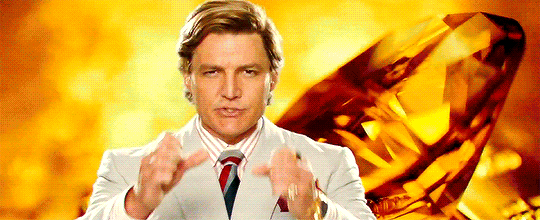
You had been mesmerised just from entering Black Gold Cooperative— but actually stepping foot in Maxwell Lord's office was a whole different story. The entire building was decked out in Christmas decorations, pine trees and tinsel on every corner, but as you stepped foot in his larger-than-life office, there was not a single thing that highlighted festive spirit in sight. Nevertheless, you were in awe, immediately taking in the paintings, the pottery, the statues… it was like every little thing was embellished in gold. You hadn't even laid your eyes on Maxwell yet, but he was certainly looking at you.
You weren't exactly sure what you took a man like Maxwell Lord for. You considered him to be the tacky kind— but every piece of furniture in his office looked antique— like it came straight out of a museum. You admired the paintings on the walls. One thing's for sure, you didn't expect him to be a man who appreciated art culture. They were magnificent, and of all different shapes and sizes.
Maxwell Lord slouched back into his chair and watched you intently, his dark eyes following your every move. You were like no other girl who had come in for an interview, that's for sure. You were dressed in a thick, cream coloured winter coat and he noted the hat and gloves that were stuffed messily into your pocket. Your wet boots left a puddle of water where you had entered his office and he noted the little snowflakes balancing in your windswept, knotted hair.
He was surprised, to say the least. The past week he had been conducting interviews in-attempt to find someone suitable for the job role at hand. Dozens of young girls would confidently strut into his office— their high heels clicking against the expensive marble floor. They would try wooing him with a bat of eyelashes, which of course, Maxwell did not shame their attempts. Despite their unsuccess at acquiring the job, Maxwell did make sure they got a little something from him in return.
The businessman's eyes darted to the trash can under his desk as he looked at the discarded silk handkerchiefs he had just used to clean himself up after his last interview. Then, he re-acquainted his gaze to you, and picked up on the fact that you had yet to acknowledge his presence. You were too caught up in the furnishings of his office. You really were different.
"Ms Minerva?" Maxwell called you eventually, clearing his throat. Not recognising your newly claimed fake name, you didn't budge, but instead let your fingers trace the countries of a world map that hung on the wall. Pins had been stabbed into the capitals of most countries and you wondered what it meant. Perhaps it was all the countries he had visited— or more likely, all the companies that had shares in his black gold business. "Ms Minerva." Maxwell repeated, his voice more solid this time.
You felt your body freeze up, wondering how long he had been calling you for. Shit, you thought. You really believe you had messed up— just stumbling into his office and paying no attention to him whatsoever.
"Oh!" you gasped, spinning around on the heel of your foot, almost slipping on the water you had trailed in with you. Maxwell couldn't help but let the small smirk creep upon his lips at your clumsy but innocent nature. "Your office is… it's so…"
"What you expected?" Maxwell prompted, leaning over the desk slightly trying to get a closer look at you.
Something about your demeanor drew him to you and he couldn't place his finger on what exactly it was. He wondered what your deal was. He wondered why you had decided to attend possibly the most prestigious interview of your life dressed the way you had. You hoped he didn't think you were deliberately ignoring him.
"No- I mean. I'm not sure what I expected, really," You admitted with a small shrug before approaching an oil painting. "This is magnificent," you said. "I've never seen such intricate work before."
The painting was huge— quite possibly the biggest one in the room. It was posed, of course, and you wondered how long the poor models had to stand there to be painted. They were positioned on a grand staircase with a purple carpet rolling up it. They looked stern- mean- not an emotion in sight.
"That's a family portrait," Maxwell informed you from his chair. "My family."
Oh.
You digested the image of the couple with their young son. The child was no older than ten, you guessed, with dark blonde-browning hair and he was dressed in a shirt, shorts and bow tie. The couple stood behind him, and the pair consisted of a beautiful woman with red hair and pearl earrings wearing a fur coat and sleek silk dress. "Your wife is gorgeous." You said, quietly, entranced by the family portrait.
Maxwell paused, his eyes not moving from you for a second. "That's my mother." he deadpanned.
You curled your fingers into a fist at your own shameless and idiotic comment. You could not forget how much you needed this job— you had to do better.
"Oh," you replied, feeling a flush of embarrassment wash over you. "So that little boy is you, hm? Your hair is lighter nowadays," you smiled light-heartedly but Maxwell didn't share the warm sentiment. "You look just like your father." You admitted, eyes flicking between the suited man in the painting, and the suited man who was sitting at his desk behind you.
Both men were of an average height, with broad shoulders and the same, identical cunning smirk. Big brown eyes and swept but styled hair. You very little about the Lord family — to the general public, they were always an enigma. Tabloids would spread rumours and no one ever really knew the truth. You hoped you hadn't hit a nerve with the comparison, but as seconds went on, you cursed yourself for your inability to just keep your mouth shut.
Maxwell didn't reply to your comment, and the silence was deafening. For the first time, he looked away from you and into the light oak wood of his desk which he had inherited from his late father. He let a few sad thoughts ponder his mind as you continued to scower his office looking at all the high end decor, before taking a big huff of breath. It wasn't her fault, she couldn't know any better. Maxwell told himself, but it didn't hurt any less.
Her words stung but he pushed them back as far as he could. Blocking out his emotions was something Maxwell had done his whole life and had become quite accustomed to. This was ridiculous. Maxwell wouldn't let himself get worked up over a brief comment about his father, by a girl wearing a last season winter coat who he had never met before. He stiffened up and cleared his throat.
"Ms Minerva, if you are going to just scope my office I'd be in my right mind to call security and have you thrown out." Maxwell sighed, tapping his fingers impatiently against the desk. Your head bolted towards him.
"Oh! I'm so so sorry." you pressed your hands in a pleading manner.
As Maxwell took in your form, his mind began to race. He could get used to looking at you like that. Pleading for him— on your knees— begging for just a taste of what he had to offer. The dirty thoughts consumed his mind and he shifted in his chair feeling a familiar fire in his lower stomach. Brushing past your pretty, doe-like eyes, he reached for a gold fountain pen and an expensive looking journal, opening it up.
"Why are you here?" Maxwell asked, dropping the pen, slouching back into his leather chair and kicking his feet up on his desk. You swallowed the hard lump that had appeared in your throat as you took in his posture.
"Uhm, well I- uh-" you struggled to find words. My god he was attractive. You hadn't paid much attention before, but now that he was sitting there right before your eyes, you felt a small warmth creep up between your legs.
He was just lounging right before you— his body spread out. He wasn't wearing the smart suit jacket as you had pictured, but instead, a crisp white button down shirt with the sleeves rolled up to his elbows. You could see the light hair on his arms glisten under the setting sun, and the yellow gold of his Rolex wristwatch sparkle as he played with the rings on his fingers.
Maxwell caught you staring at his hands. How could you not? Teasingly, he began rolling his jewelled rings up and down his long thick fingers. You found yourself biting your lower lip, pulling all your energy into suppressing a moan as you watched the way his fingers moved. You took in every detail, wanting to remember it forever— the light bronzed shade of his skin and the wrinkles over his knuckles. His nails were short but definitely well manicured. You let out the smallest gasp as you imagined how they would feel inside of you. You wondered how many of his fingers you could take and how they would stretch you open. You imagined his thumb rubbing circles into your clit as he finger fucked you and suddenly you felt your panties dampen. Your knees went weak.
He moved his large ring clad hands and folded them against his broad chest, a devilish smirk playing on his lips. You always wondered to what extent his magazine covers had been edited but he was just as handsome as he was on television, in real life. One thing you noticed was that his usual styled dark blonde hair was only slightly out of place, and the top two buttons of his shirt were undone. It was a change from his ordinary pristine appearance. Seeing that you were struggling to answer his question, Maxwell pointed his finger and gestured you closer to him. You walked towards him and stood still in front of him, only his desk between you both.
"Take it off." he mumbled, his gaze strong and steady on your body. You swore your mind was playing games on you as you engulfed his dark choice for words. You were absolutely ready to submit to him but deep down you knew that you were over-thinking.
"I- I'm sorry?" You croaked out.
His smirk grew and a small dimple appeared in his left cheek. "Your coat. Take it off." He commanded and you mouthed a small 'oh' before following his instructions and dropping your wet winter coat to the floor. You cursed yourself. You were ready to completely undress yourself for this man you had never met before. Did he have this effect on everyone? "Turn around." he prompted you, twirling his finger in gesture. You slowly spun around a few times and Maxwell was struggling to contain himself.
You were delightful— wearing just a pair of washed out flared jeans and a geometric print t shirt. The jeans were very 70s, flaring out at the bottom, and Maxwell wondered how out of date your wardrobe was. He wondered if you'd let him take you out clothes shopping. Maxwell felt flushed as he took in how perfectly the denim sculpted your thighs and the round of your ass. He found your body exquisite. The t-shirt was thin, and he was surprised you had opted for such a fashion choice in the depth of winter. Despite the central heating being turned on, he couldn't help but notice the way your nipples poked through your shirt, hardened from the cold weather— or so he assumed they were hard from the cold weather. You felt his eyes bore into your chest and you crossed your arms over yourself, hoping he hadn't spotted your arousal. Maxwell felt his cock twitch at the sight of you and he fought the urge to bend you over and fuck you right then and there on his desk. You had an air of innocence to you, and he didn't want to ruin that. At least, not yet.
"Is everything okay sir?" Your voice was soft like honey and a small grunt escaped Maxwell's throat. He had just gotten off with his previous interviewee but you were simply something else.
"Perfect," he hummed wistfully. "Please, take a seat." You obeyed his order and slid down into the chair opposite to him. "Tell me, Ms Minerva. What urged you to lie about your identity?"
You felt your heart stop and your fingers gripped the arms of your chair. Shit, you thought to yourself. He had caught on. You gulped and tried to find a quick witted yet believable response to him but it you couldn't. Normally you were great at answering back but sitting before Maxwell Lord had you feeling some kind of way and you couldn't shake it.
"Tell me, who are you really?" He urged. You contemplated his words and decided there was no pointing in continuing your long winded lie. You were surprised you had made it this far without getting caught in the first place. He was still smirking, however, and it seemed like he didn't really care at all. Giving in, you told him your real name.
"Mr Lord, if I may ask, how did you know I wasn't Barbara Minerva?" you asked Maxwell.
"I can read minds." Maxwell said darkly, staring deep into your eyes.
Oh, his eyes. They had darkened significantly— once a chocolate brown but now they could easily be confused for black. Suddenly the extravagant decor around his office had become a mere back thought and you had been absolutely captured by his handsome looks. His skin was golden under the setting sun behind him and it accentuated the blonde highlights in his hair. His eyelashes were long and dark and his lips were the perfect shape. His nose was rather prominent and curved slightly and you imagined what it would be like pressed against your face as he kissed you.
You wanted him to take you in his arms and glide his large hands all over your body, caressing you and touching you everywhere he could. Sliding his hand up your shirt and cupping your breast as he settled lazy sloppy kisses into your neck and collarbones. Realising you had been silent for perhaps a moment too long, you let out a loud laugh.
"Right," you chortled in disbelief. "Read minds. Very funny." you grinned and you even caught him stifle down a dry chuckle.
"I like you," Maxwell admitted and you felt your heart stop. "I think you'd be well suited working for me. Of course… we might have to sort out your wardrobe. I'd like to offer you a job."
He had barely asked you any questions and he already made his mind up. You couldn't believe your luck.
"Wait, really?" you asked, your eyes widening with delight.
Maxwell nodded slowly. "Did one of my secretaries have you sign an NDA on your way in here?"
"Yes sir," you bit your lip anxiously. You had wondered what the non-disclosure agreement was for.
"So you know that if you repeat any of this to anyone else after our interview is over, I can and will sue you."
Not that you had any money anyway, his cold words still made you nervous. He was one of the most powerful men in the world. Friends with the president of the USA, he had relations with practically every country who bought his oil, and now, he was offering you a job.
"Yes sir." you repeated obediently, fluttering your eyelashes at him. The way that word rolled off your tongue— He felt his cock harden in his pants. You were just so damn pretty.
"I have to tell you then," Maxwell leaned forward on his desk, interlocking his fingers together. He was inches away from you, gazing into your eyes. "I'm not looking for an assistant." His voice was dark and menacing and a lustful glint appeared in his eyes.
"You- you're not?" You stammered, feeling your cheeks flush with heat. You wondered what job you had actually gone for.
"How familiar are you with sugar dating?" Maxwell raised an eyebrow, his eyes now glaring dark and sinister.
"Su-sugar dating?"
You weren't overly familiar, but sure, you had read your fair share of erotic novels that illustrated such prospect.
Maxwell stood up from his chair and walked around his desk before perching on top of it and looking down at you. "I'm looking for a certain kind of arrangement, per-se," Maxwell explained. "You give me what I want, and I give you what you want. Money, clothes, diamonds, jewellery, cars… whatever your heart desires. It's yours. Think about finally having everything you always wanted."
Your gaze met the floor as you contemplated his words. No, he couldn't be serious. He had the wrong girl. "Sir," your voice was a timid whisper. "I don't think I possess anything you could want." you told him sadly, insecurity bubbling inside you. He was the Maxwell Lord. Esteemed, knowledgeable, reputable, and he worked amongst the most beautiful and well dressed women you had ever seen. Yet, here you were, sitting before him, and he had chosen you.
Maxwell shook his head. "No." he said simply, extending his arm and curling his fingers around your chin, pointing it upwards so you were looking up at him. He wanted to trace your pretty lips with his fingers— spread them apart and feel the warmth as he let you taste him.
"No?" You beckoned, your heart trashing against your chest. His hands were so soft but his touch was rough and he steadied the hard grip around your face. If it were any other man, you would've pushed him off you, cursing him. But this wasn't just any man.
"You have everything I want."
December Magic: @kiwi-the-first @100layersofdaddyissues @mrschiltoncat @honeymandos @thisisthe-way @this-cat-is-dea
Permanent: @goth-topic @supernaturalgirl @phoenixhalliwell @ah-callie @luvzoria
#maxwell lord#maxwell lord x reader#maxwell lord smut#pedro pascal#pedro pascal x reader#pedro pascal smut#max lord#max lord x reader#max lord smut#december magic#pedro pascal christmas
191 notes
·
View notes
Text
Fahrenheit 451
With school turning out more runners, jumpers, racers, tinkerers, grabbers, snatchers, fliers, and swimmers instead of examiners, critics, knowers, and imaginative creators, the word 'intellectual,' of course, became the swear word it deserved to be. You always dread the unfamiliar. We must all be alike. Not everyone born free and equal, as the Constitution says, but everyone made equal. Each man the image of every other; then all are happy, for there are no mountains to make them cower, to judge themselves against. So! A book is a loaded gun in the house next door. Burn it. Take the shot from the weapon. Breach man's mind. Who knows who might be the target of the well read man? Me? I won't stomach them for a minute.
"When did it all start, you ask, this job of ours, how did it come about, where, when? Well, I'd say it really got started around about a thing called the Civil War. Even though our rule-book claims it was founded earlier. The fact is we didn't get along well until photography came into its own. Then motion pictures in the early twentieth century. Radio. Television. Things began to have mass.
And because they had mass, they became simpler. Once, books appealed to a few people, here, there, everywhere. They could afford to be different. The world was roomy. But then the world got full of eyes and elbows and mouths. Double, triple, quadruple population. Films and radios, magazines, books leveled down to a sort of paste pudding norm, do you follow me?
Picture it. Nineteenth-century man with his horses, dogs, carts, slow motion. Then, in the twentieth century, speed up your camera. Books cut shorter. Condensations, Digests. Tabloids. Everything boils down to the gag, the snap ending. Classics cut to fit fifteen-minute radio shows, then cut again to fill a two-minute book column, winding up at last as a ten- or twelve-line dictionary resume. I exaggerate, of course. The dictionaries were for reference. But many were those whose sole knowledge of Hamlet (you know the title certainly, Montag; it is probably only a faint rumor of a title to you, Mrs. Montag) whose sole knowledge, as I say, of Hamlet was a one-page digest in a book that claimed: now at least you can read all the classics; keep up with your neighbors. Do you see? Out of the nursery into the college and back to the nursery; there's your intellectual pattern for the past five centuries or more.
Speed up the film, Montag, quick. Click? Pic? Look, Eye, Now, Flick, Here, There, Swift, Pace, Up, Down, In, Out, Why, How, Who, What, Where, Eh? Uh! Bang! Smack! Wallop, Bing, Bong, Boom! Digest-digests, digest-digest-digests. Politics? One column, two sentences, a headline! Then, in mid-air, all vanishes! Whirl man's mind around about so fast under the pumping hands of publishers, exploiters, broadcasters, that the centrifuge flings off all unnecessary, time-wasting thought!
School is shortened, discipline relaxed, philosophies, histories, languages dropped, English and spelling gradually neglected, finally almost completely ignored. Life is immediate, the job counts, pleasure lies all about after work. Why learn anything save pressing buttons, pulling switches, fitting nuts and bolts?
Empty the theatres save for clowns and furnish the rooms with glass walls and pretty colors running up and down the walls like confetti or blood or sherry or sauterne. You like baseball, don't you, Montag? More sports for everyone, group spirit, fun, and you don't have to think, eh? Organize and organize and super organize super-super sports. More cartoons in books. More pictures. The mind drinks less and less. Impatience. Highways full of crowds going somewhere, somewhere, somewhere, nowhere. The gasoline refuge. Towns turn into motels, people in nomadic surges from place to place, following the moon tides, living tonight in the room where you slept this noon and I the night before.
Now let's take up the minorities in our civilization, shall we? Bigger the population, the more minorities. Don't step on the toes of the dog-lovers, the cat-lovers, doctors, lawyers, merchants, chiefs, Mormons, Baptists, Unitarians, second-generation Chinese, Swedes, Italians, Germans, Texans, Brooklynites, Irishmen, people from Oregon or Mexico. The people in this book, this play, this TV serial are not meant to represent any actual painters, cartographers, mechanics anywhere. The bigger your market, Montag, the less you handle controversy, remember that! All the minor minor minorities with their navels to be kept clean. Authors, full of evil thoughts, lock up your typewriters. They did. Magazines became a nice blend of vanilla tapioca. Books, so the damned snobbish critics said, were dishwater. No wonder books stopped selling, the critics said. But the public, knowing what it wanted, spinning happily, let the comic-books survive. And the three-dimensional sex-magazines, of course. There you have it, Montag. It didn't come from the Government down. There was no dictum, no declaration, no censorship, to start with, no! Technology, mass exploitation, and minority pressure carried the trick, thank God.
You must understand that our civilization is so vast that we can't have our minorities upset and stirred. Ask yourself, What do we want in this country, above all? People want to be happy, isn't that right? Haven't you heard it all your life? I want to be happy, people say. Well, aren't they? Don't we keep them moving, don't we give them fun? That's all we live for, isn't it? For pleasure, for titillation? And you must admit our culture provides plenty of these.
Colored people don't like Little Black Sambo. Burn it. White people don't feel good about Uncle Tom's Cabin. Burn it. Someone's written a book on tobacco and cancer of the lungs? The cigarette people are weeping? Burn the book. Serenity, Montag. Peace, Montag. Take your fight outside. Better yet, into the incinerator. Funerals are unhappy and pagan? Eliminate them, too. Forget them. Burn them all, burn everything. Fire is bright and fire is clean.
[There was a girl next door. She's gone now, I think, dead. I can't even remember her face. But she was different. How? How did she happen?]
Here or there, that's bound to occur. Heredity and environment are funny things. You can't rid yourselves of all the odd ducks in just a few years. The home environment can undo a lot you try to do at school. That's why we've lowered the kindergarten age year after year until now we're almost snatching them from the cradle.
If you don't want a man unhappy politically, don't give him two sides to a question to worry him; give him one. Better yet, give him none. Let him forget there is such a thing as war. If the Government is inefficient, top-heavy, and tax-mad, better it be all those than that people worry over it. Peace, Montag. Give the people contests they win by remembering the words to more popular songs or the names of state capitals or how much corn Iowa grew last year. Cram them full of non-combustible data, chock them so damned full of 'facts' they feel stuffed, but absolutely `brilliant' with information. Then they'll feel they're thinking, they'll get a sense of motion without moving. And they'll be happy, because facts of that sort don't change. Don't give them any slippery stuff like philosophy or sociology to tie things up with. That way lies melancholy. Any man who can take a TV wall apart and put it back together again, and most men can nowadays, is happier than any man who tries to slide-rule, measure, and equate the universe, which just won't be measured or equated without making man feel bestial and lonely. I know, I've tried it; to hell with it. So bring on your clubs and parties, your acrobats and magicians, your dare-devils, jet cars, motorcycle helicopters, your sex and heroin, more of everything to do with automatic reflex. If the drama is bad, if the film says nothing, if the play is hollow, sting me with the Theremin, loudly. I'll think I'm responding to the play, when it's only a tactile reaction to vibration. But I don't care. I just like solid entertainment."
We always talk about 1984 and Brave New World as the dystopias we are living in today, but Ray Bradbury´s book, written in the early 50s, is scarily accurate, describing perfectly and especially the last three/four years.
3 notes
·
View notes
Text
Natsume Yuujinchou: “Village of the Sleeping Vessel (Part 2)” Summary (Chapter 101)
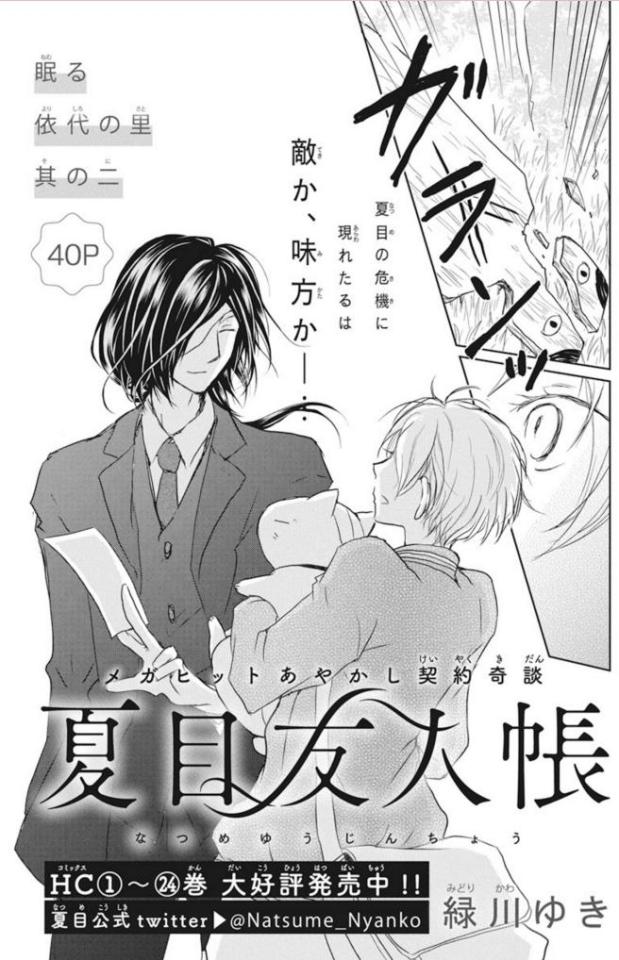
The person who appears in front of Natsume during a crisis… Is he an enemy, or an ally—…?
The long-awaited continuation to the latest arc! This chapter was so intense I felt like I was doing more translating than summarizing lol. Regardless, I hope you guys enjoy the chapter!
This issue comes with a Nyanko-sensei cable tie, so if anyone likes that, feel free to get a copy.
The next chapter will come out on September 24th.
Special thanks to Jessica for proofreading, as always!
- Niji
[Everything under the cut]
Chapter 101: “Village of the Sleeping Vessel”(Part 2)

Natsume: Ma… Matoba-san!? Why are you here…?
Matoba: I came to help.
Natsume: Huh————
Nyanko: They are coming.
Just as Nyanko-sensei says, a swirl of wooden dolls head towards them. Matoba, unfazed, looks at them with a smile.
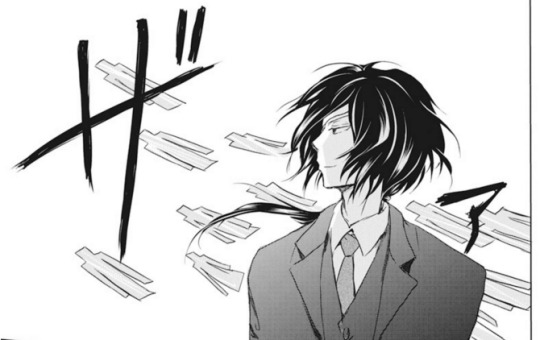
Paper dolls attack their wooden attackers, just as Natori appears.
Natori: Thank goodness you’re alright. Take this chance and come with me!
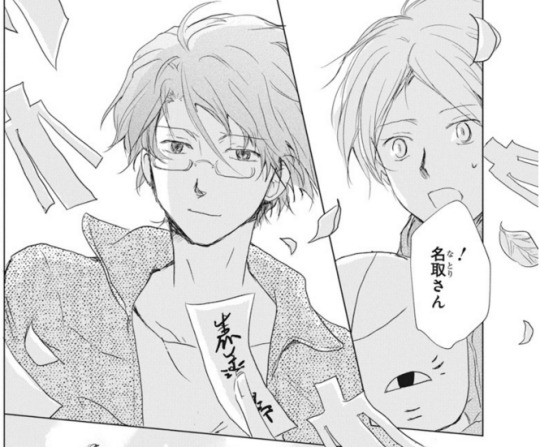
Natsume: Natori-san!
Natori: Hey, Natsume.
The five of them take shelter behind some trees.
Natori: ——Hiiragi, good work protecting them until we came.
Hiiragi: Master.
Natori: For now, let’s look for a place to hide. Seriously, Natsume… Why did you turn up at a place like this?
Natsume: Well… Nyanko-sensei mysteriously ran away from home, so I was looking for him…

Natori: He ran away from home?
Nyanko: AS IF I’D DO SOMETHING LIKE THAT! It’s just Natsume with his super-ultra-level misunderstanding!
Natsume: …Um, the whole story is pretty complicated… Meanwhile, why are you here at this village as well? Even Matoba-san has come along…
Matoba: …I was in the middle of an important lunch meeting as the head of my clan.
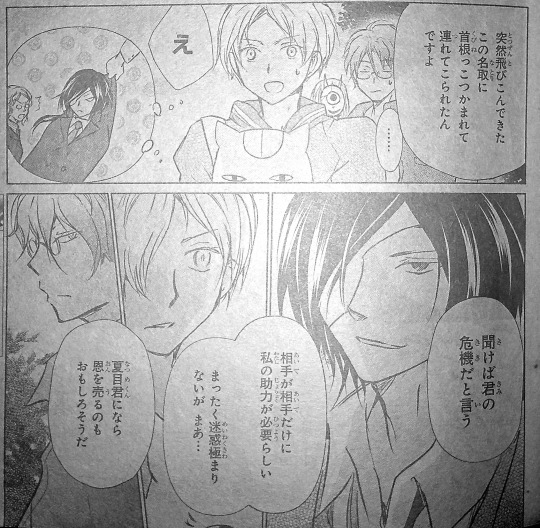
Matoba: All of a sudden that Natori dashed in and dragged me away by the scruff of my neck.
Natori: ……
Natsume: What?
Matoba: When I asked for the details, he said that you were in danger. With the other party being who he is, it seemed he needed my help. Honestly, this is extremely bothersome, but well… I think it’ll be interesting to have you be indebted to me, Natsume-kun. Besides, I was curious as to why Natori’s shiki were in this village. Why were you monitoring that man?
Natsume: Monitoring… Do you mean that man with long hair?
Natori: …Well, we have our circumstances… ——Hiiragi, what was that man doing here?
Hiiragi: ——… That man…
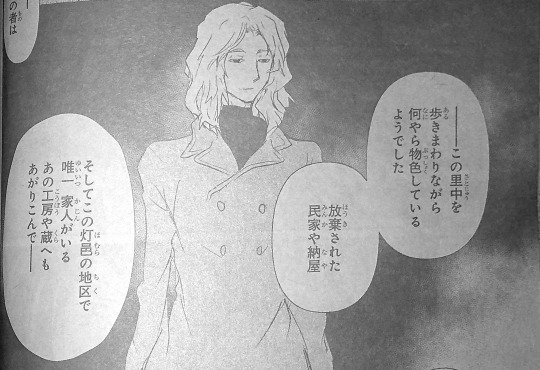
Hiiragi: ———He was walking around the village as if he was looking for something. He would check abandoned houses or sheds, and eventually he even entered the workshop and warehouse of the only family that remained in this Homura District——
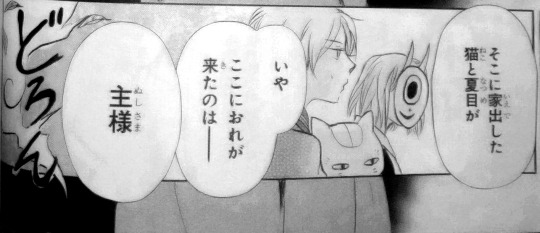
Hiiragi: There, I saw Natsume and the cat, who had ran away from home.
Natsume: No, I came here because——
Sasago and Urihime appear in a puff of smoke, interrupting their conversation. It seems that they've been looking around, and found that a barrier has been erected around the village.
Natori: It’s as I thought… This will be troublesome.
Matoba: Well, this does sound like something he would do.
Natsume: ——A barrier…?
Natori sends Sasago and Urihime to investigate the nature of the barrier, and they leave.
Natsume: ——Natori-san.
Natori: Natsume… I would like to send you back home immediately, but…

Natori: Ayakashi——— Your Sensei, is currently unable to get out of here. This village has already become his hunting ground.
Natsume: Hunting ground…………
Just as they say this, they catch a glimpse of a wooden doll in the sky. They will need to find a new hiding place soon.

Nyanko: Hey, Natsume. Do you smell something? From beyond those bushes.
Natsume: Huh…? I hope it’s not a delicious-smelling udon shop or something, Sensei.
Nyanko: NO!! Still, it’s still a strange… scent…
Natori: … *sniff* I can’t smell it.
Hiiragi: ——No, now that he mentions it… It doesn’t smell bad, but it makes me feel like I shouldn’t get close…
Matoba: In that case, we should head towards it.
Natsume: Huh? But…
Matoba: If that place makes ayakashi feel as though they shouldn’t get close, then those wooden dolls are unlikely to come near it too.

Natsume & Natori: WOW… (……I would have preferred an udon shop……)
Matoba: Isn’t it great that it isn’t an udon shop? Seems like it isn’t really a significant building. Let’s enter.
Natori: Wha-! Oi!

They enter the building and look around, but see that nothing is inside. Natsume finds the building rather strange, and asks if Nyanko-sensei and Hiiragi are feeling okay. They both confirm that they felt alright the moment they entered the building.

Natsume: ——Why is there something like this here…?
Natori: It’s probably because… this place is connected to an exorcists’ neighborhood. In the past, under the guise of a pottery village, Homura specialized in creating porcelain that could be used as effective exorcism tools*.
Natsume: Exorcism tools——?
Natori: Somehow, Hakka Pottery harbored mysterious powers. All the exorcism tools that were created here, be they masks or pots, were all top class items.
Matoba: Many of them were artisans who took their work seriously, so they weren’t keen on dealing with anyone who weren’t interested in their art. Because of that, their work don’t often appear on the market. They truly are phantom tools. However, time passed and the artisans with the power to create such works began dying out.
[A more literal translation of this term is “tools to aid their technique/magic”. I’m exercising some creative liberties here in order to make it digestible in English.]

Matoba: Now, it’s but a miserable village with only one pottery kiln left.
Natsume: ——… (That person’s——)
Natori: In any case, this is a place with such a history. Something might have been left behind here. There are also violent people who come to this place. Be they exorcists with strong ambitions, or Collectors with no integrity.
Natsume tells them that the long-haired man was called a collector, and Matoba explains that a “Collector” is a term used in their business to refer to people who collect items related to ayakashi, or exorcism tools that harbor strong powers. Natori says that the man Natsume met was called “Ban”, an infamous practitioner who serves a female Collector.
[Imma just put all subsequent mentions of ‘Collector’ with a capital letter, since it’s now established that they aren’t just normal collectors. Also, “Ban” literally means ‘companion’, ‘attendant’, or ‘follower’, which makes me laugh a little because his whole identity is apparently just acting as someone’s servant. It’s a bit ironic considering the threat he’s supposed to pose in this arc.]

In the forest, Ban discovers his broken wooden dolls among shreds of paper.
Ban: Where... did these rats come from?
Back in the building, Natori explains that Ban comes from an old line of exorcists and can control dolls made from wooden planks. He is known for surrounding his prey as though he is on a hunt.
Natori: You could joke that he’s like a hunter now that he’s working to collect exorcism tools, but it is nothing to laugh at. Anyway, as long as it’s for his master’s collection, he will show no mercy. Once he has his eye on something, he must attain it. He would even visit various places for unknown items.
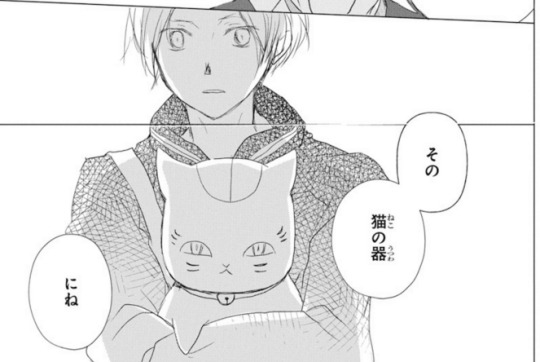
Matoba: ——And then, when he came to this village, Ban happened to encounter an extraordinary exorcism tool. It’s what you are holding. The vessel that your cat is in.

Ban: (I also want that.)
Natsume: ——… …… Thank you, very much……
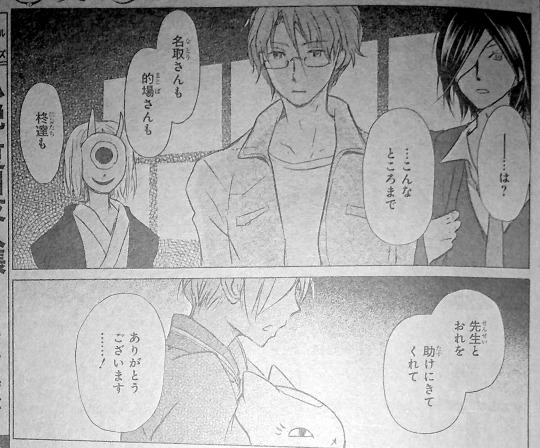
Matoba: ——… Huh?
Natsume: …You came all this way… Natori-san, Matoba-san, and even Hiiragi and the other shiki… You came to help Sensei and me… Thank you very much……!

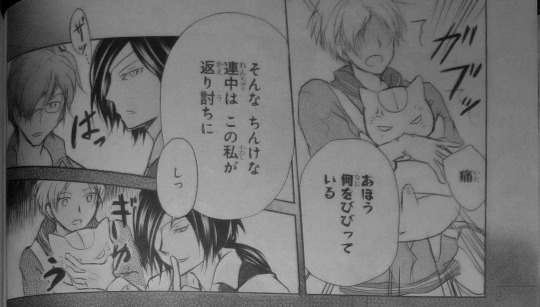
Nyanko: *Chomp!*
Natsume: OUCH!
Nyanko: You fool! What are you getting all afraid for!? I could easily beat this group of weaklings at their own game—
Matoba: *grab!* Shush!
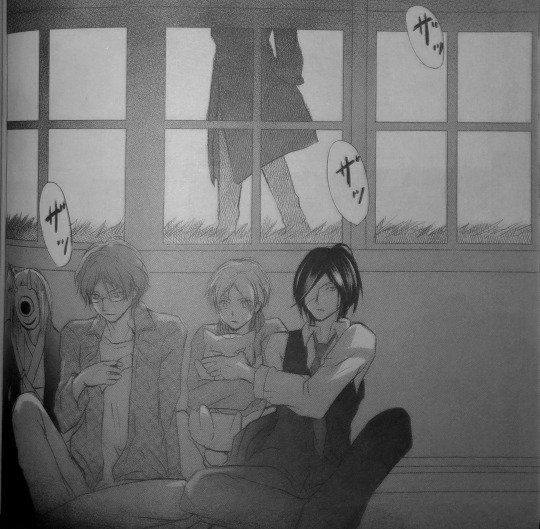

Natsume: (——He’s walking around the building——…)
Eventually, Ban leaves the area, and disappears into the forest. Matoba, seeing this as a chance, suggests that they head towards the pottery workshop.
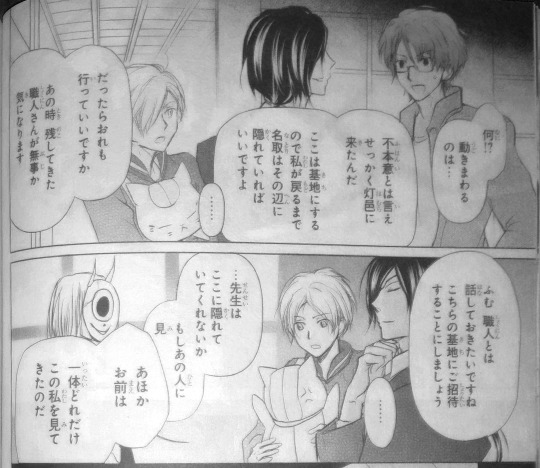
Natori: What!? Moving around is a bad idea—
Matoba: Though I was unwillingly brought here, it’s still a rare chance for me to come to Homura. We can make this our hideout, so until I return, you can just hide at that corner over there, Natori.
Natori: ……
Natsume: If you’re going, can I come along too? The potter stayed behind when I ran away, and I’m concerned about his well-being.
Matoba: Hm… I would love to have a talk with the potter as well. Why don’t we invite him over to this hideout of ours?
Natsume: …… …Sensei, could you hide here as well? If that person finds you—
Nyanko: Are you an idiot? Just what do you see me as?

Nyanko: The one you should be afraid of isn’t that vulgar huntsman. It is me. You should be doing your best to worry for that man, so that I don’t run out of here and gobble him up.

Natsume: ——Is that so?
Nyanko: It is so.
Sasago and Urihime investigate the barrier, confirming that they cannot escape through the sky. The barrier is shaped like an overturned bowl, a type unique to Ban’s family.

Urihime: If we want to break it—— I hate to say it, but perhaps we can ask that clan head—
Sasago: *shudder!*
Urihime: What’s wrong, Sasago?
Sasago: —Nothing, it’s just, I saw something pass under us.
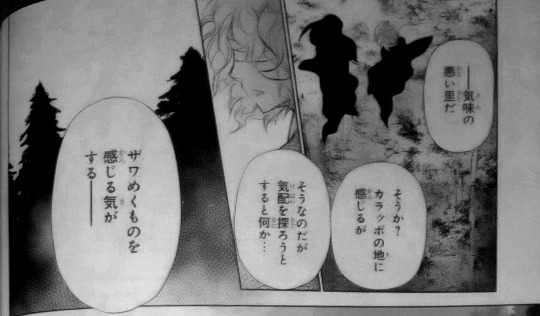
Sasago: ——It’s an eerie village.
Urihime: You think so? Do you feel something from this empty land?
Sasago: I do, however… When I try to find their presence, somehow… There’s something that makes me feel uneasy———
Back to Natsume’s group, they are all making their way towards the workshop when Matoba decides to split from the group.
Matoba: ——There’s a warehouse in this direction, isn’t there? I’ll part here.
Natori: Matoba-san! You can’t just enter them however you want———
Matoba leaves anyway, leaving the rest to continue towards the workshop. Things are strangely quiet around them, as Natsume slowly evaluates the dilapidated state of the village, and how only one person — the potter, “Tomuro” — is living in it now.
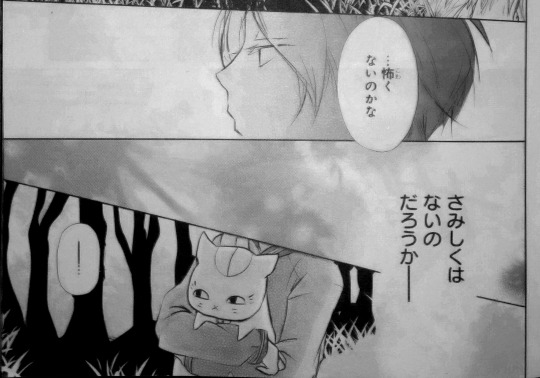
Natsume: …Isn’t he afraid? (Isn’t he lonely——?)
Nyanko: ——…
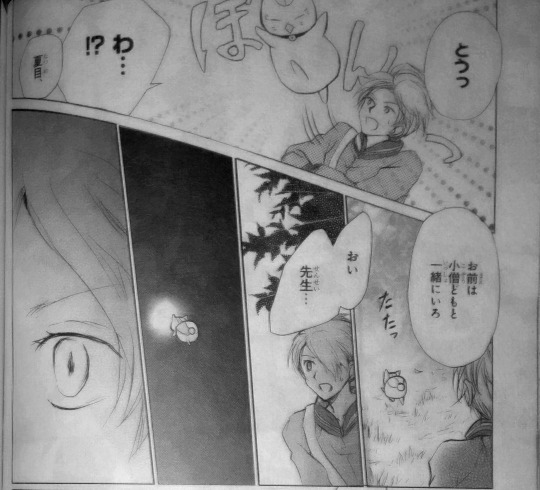
Nyanko: Hop!
Natsume: WHA-...!?
Nyanko: Natsume, you head on with the other brats. *dash*
Natsume: Oi, Sensei-...
Seeing how the figure of Sensei running away matches with that in his dream, Natsume chases after him. He comes to a house, and sees Tomuro lying unconscious.
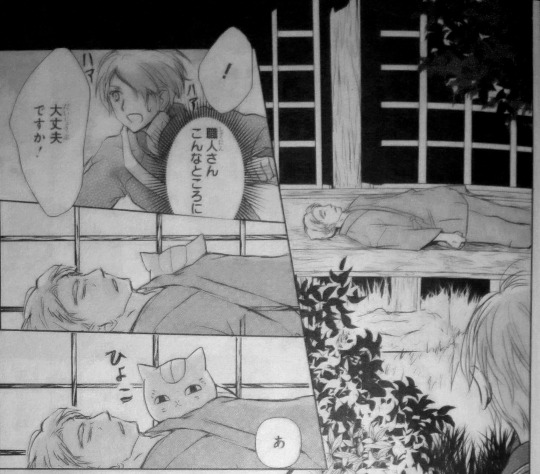
Natsume: (The potter is in a place like this!) Are you alright!?
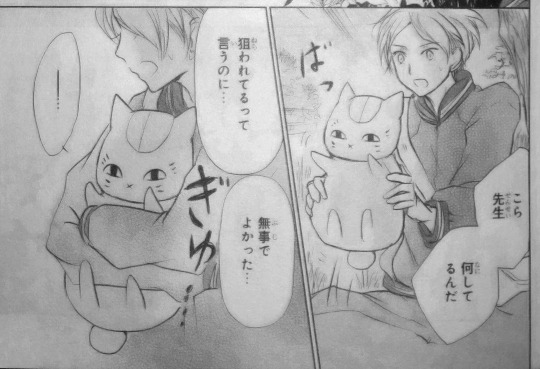
Natsume: Ah! Hey, Sensei. What are you doing? We even told you that you’re being targeted… Thank goodness you’re alright… *hug…*
Nyanko?: ——…
Natori and Hiiragi catch up to him, and they determine that Tomuro was caught under a sleeping spell. They agree that it might be safest to bring him to their hideout, since it dispels ayakashi.

Natori: ——By the way, Natsume. Right now, is the Book of Friends…
Natsume: ——I brought it with me…
Natori: …I see. I’m sorry. Even though it was for an emergency, I ended up bringing a dangerous person along. Since we are going against Ban, I needed Matoba’s advice no matter what…………… ——Natsume, since Matoba and… Ban, are both focused on Sensei, you must make sure that they don’t take notice of that.
Natsume: ———… Yes.

Natsume: Haaaah…
Natori: ———What’s wrong?
Natsume: Nothing. I just thought it was a good thing I told you about the Book of Friends—— I can’t tell people about it carelessly… And I intend to continue keeping it a secret from here on. But whatever happens…… I thought I should let you know about it, Natori-san——
Natori: ——…

Natori: Is the Book of Friends… heavy?
Natsume: Yes. It’s my treasure.
They begin heading back to their hideout, with Tomuro in tow. Matoba returns right at that moment, with books and scrolls under his arms.

Natori: Matoba-san! What’s with those items!?
Matoba: There were so many interesting books, I couldn’t help myself. Don’t worry, I’ll return them soon. ——Oh my. Natsume-kun, what happened with him?
Natsume: Huh?

Matoba: Who is that cat you have with you?
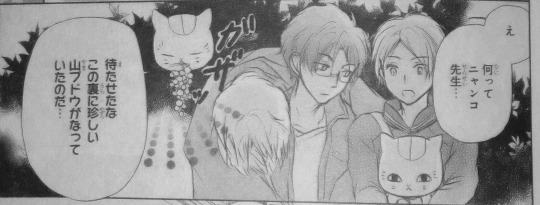
Natsume: Huh? What do you mean? It’s Nyanko-sensei…
Nyanko: *rustle* I’ve kept you waiting! There were some rare mountain grapes in the back…
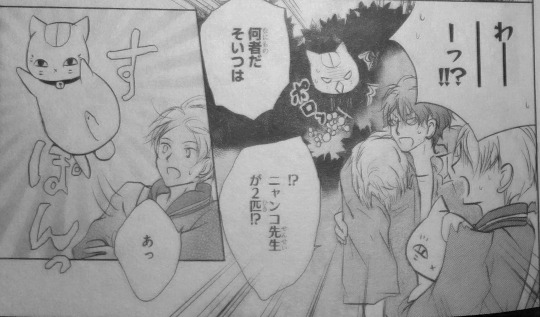
Everyone: WAAAH—————!!?
Nyanko: Who in the world is that!?
Natsume: !? Why are there two Nyanko-senseis!? Ah!
The fake Nyanko-sensei leaps out of Natsume’s arm, when Natsume spots a missing piece from its back. Nyanko-sensei tells Natsume to chase after his impostor, and they find themselves in a house, where the fake Sensei slips into a room. Natsume and Nyanko-sensei dash in.

Nyanko: Natsume, above!

[OMG LOLOL]

Natsume and Nyanko-sensei scream, scaring all the cats away. When Natori and Hiiragi finally reach them, both of them are in so much shock that they can’t even form coherent words.
Back at their hideout, Tomuro wakes up and sees them sitting around him.
Tomuro: …Are you exorcists?
Natori: ———………
Matoba: Yes, it’s amazing you could tell.
Tomuro, in a delirium, explains that only exorcists would visit this village. Unfortunately, he doesn’t have the power to create exorcism tools, and that, as they can see, there’s no longer anything left.
Matoba: ——But it seems like you have quite a few cats.
Tomuro: ...Cats? Ah… That brings back memories… Indeed, there was a period of time in the past where vessels, used as cursed tools, were made in the shape of fortune cats. However, it turned out to be much too powerful of a tool, so they stopped selling them. I heard that they were sealed in a warehouse on this land. However, a long time ago, a huge fire consumed the contents of that warehouse, and not a single one remained. I have never seen it outside of the catalog, so I’m afraid I can’t sell it to you either.
Natsume realizes that the black Nyanko vessel that Riou was sealed in was probably made here. And, likewise, Nyanko-sensei’s fortune cat form was also made here…
Tomuro continues by saying that the village has nothing but a potter who is only able to make commonplace pottery, and implores them to leave. He immediately falls asleep after finishing his words.
Natori notices Natsume looking thoughtful, and asks if he is alright. Natsume explains that he recalled what Ban had told him back at the workshop… “I also want that, which you have.”
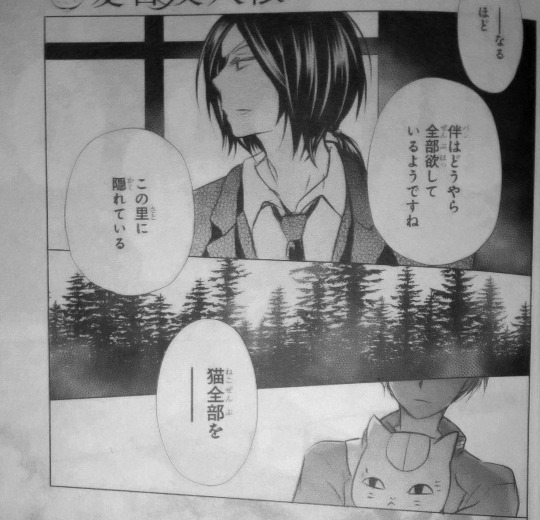
Matoba: ——I see. It seems like Ban wants every single one of them. All the cats that are hiding in this village———
Urihime and Sasago continue their investigation in the forest.

Urihime: So this is where you sense that presence to be? It’s no good. We can’t find anything.

Urihime: Perhaps we should head back to where our master is.
Sasago: Indeed. Meanwhile, it’s likely that there’s another…
Urihime: ——… Sasago…?
Back at the hideout…
Natori: ——So that means, Ban also noticed the group of cats that Natsume saw…
Natsume: Just who…… could those cats be? Are they like Sensei, with something sealed inside each of them…? (If that’s the case, why would they all be at the village…?)

Matoba: Well, whoever they might be, it wouldn’t matter to Ban.
Natsume: Huh?
Matoba: We told you, didn’t we? The Collector of exorcism tools that he is working for, couldn’t care less what is inside.

Something moves behind them, causing Natsume and Natori to flinch. They turn around, only to see that Tomuro has disappeared. Searching for where the sound might’ve come from, they run downstairs, and there—
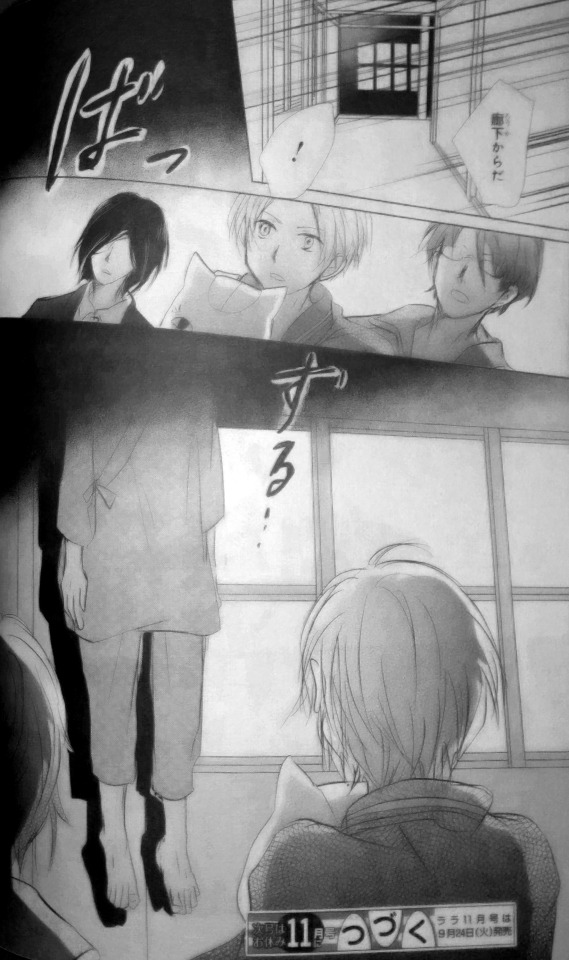
[Every single part of this arc is just gonna end on a cliffhanger, isn’t it? God dammit Midorikawa-sensei!]
“Village of the Sleeping Vessel” TO BE CONTINUED
#natsume yuujinchou#natsume's book of friends#Natsume Takashi#Nyanko-Sensei#manga#summary#apta scans#spoilers#natsume manga spoilers#translation#Midorikawa Yuki#Yuki Midorikawa
330 notes
·
View notes
Text
Marsha Hunt
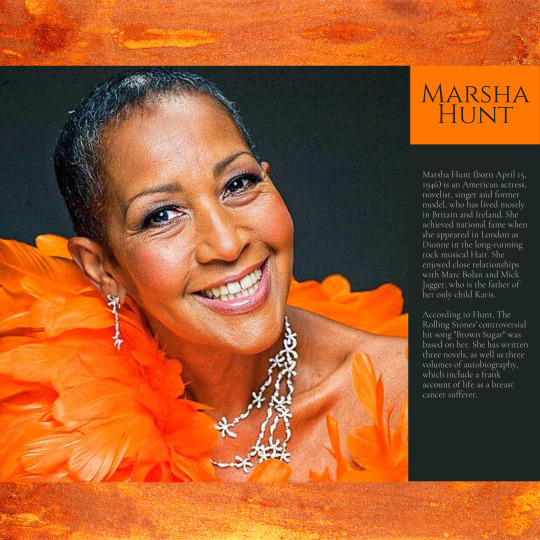
Marsha Hunt (born April 15, 1946) is an American actress, novelist, singer and former model, who has lived mostly in Britain and Ireland. She achieved national fame when she appeared in London as Dionne in the long-running rock musical Hair. She enjoyed close relationships with Marc Bolan and Mick Jagger, who is the father of her only child Karis.
According to Hunt, The Rolling Stones' controversial hit song "Brown Sugar" was based on her. She has written three novels, as well as three volumes of autobiography, which include a frank account of life as a breast cancer sufferer.
Early life
Hunt was born in Philadelphia in 1946 and lived in North Philadelphia, near 23rd and Columbia, then in Germantown and Mount Airy, for the first 13 years of her life. Hunt remembers Philadelphia with affection, particularly the "Philadelphia steak sandwiches and the bad boys on the basketball court".
Hunt's mother, Inez, was her primary parent and worked as a librarian in a local library. Hunt's father, Blaire Theodore Hunt, Jr., was one of America's first black psychiatrists but he did not live with Hunt; she found out when she was 15-years old that he had committed suicide three years previously. Hunt was brought up by her mother, her aunt, and her grandmother; three strong but very different women. Hunt describes her mother Inez as "extremely intelligent and education-minded", her Aunt Thelma as "extremely Catholic but very glamorous", and her grandmother Edna as an "extremely aggressive...ass-kicking" independent Southern woman.
Hunt credits the experience of having been poor with teaching her not to be materialistic. Her family put a great deal of emphasis on academic performance, and Hunt did very well in school. In 1960, the family moved to Kensington, California, which Hunt still regards as home, so that her brother and sister could attend Oakland High School and prepare to attend the University of California, Berkeley. Hunt also went to Berkeley, in 1964, where she joined Jerry Rubin on protest marches against the Vietnam War. In her book Undefeated she recalled that during her time at Berkeley they "were sitting in for the Free Speech Movement, smoking pot, experimenting with acid, lining up to take Oriental philosophy courses, daring to co-habit, and going to dances in San Francisco."
Move to London
In February 1966, Hunt moved to Britain and for a time lived in Edinburgh, Scotland. Hunt has said that in London in the 1960s "anything seemed possible."
Marriage to Mike Ratledge
In late 1966, Hunt met Mike Ratledge of Soft Machine. Hunt was having trouble getting a visa extension to stay in England and proposed to Ratledge. Ratledge and Hunt were married on April 15, 1967. The Soft Machine were heavily booked and there was no time for a honeymoon, but Ratledge and Hunt were able to spend two months together before the band headed for France later that year. Hunt said in 1991 that she and Ratledge never held hands and never kissed, though "...he comes for Easter. But that's what we called 'married'." While the two have remained good friends, Hunt says the secret to a happy marriage is to "separate immediately." When Hunt and Ratledge reached their 40th wedding anniversary, Hunt called Ratledge up and said, jokingly, "We should renew our vows."
Music
Although Hunt indicates that she had no great musical talent, she worked as a singer for 18 months after arriving in England. In February 1967, Hunt took a singing job with Alexis Korner's trio "Free at Last" so that she could earn her fare back home. She did not use it, but remained, and in 1968, joined the group The Ferris Wheel. That same year, Hunt achieved national fame in England when she appeared as "Dionne" in the rock musical Hair, a box-office smash on the London stage. Hunt only had two lines of dialogue in Hair, but she attracted a lot of media attention and her photo appeared in many newspapers and magazines. Her photograph was used on the poster and playbill of the original London production, photographed by Justin de Villeneuve. Her 1968 photo also replaced the original LP artwork when Readers Digest re-issued the LP in Europe in 1976. Hunt says that the role was a perfect fit for her, expressing who she actually was. She was one of three Americans featured in the London show, and when the show began she had no contract to perform. When the show opened she was featured in so many stories that she was offered a contract right away.Hunt played at the Jazz Bilzen and Isle of Wight music festivals in August 1969 with her backup band "White Trash". Hunt's first single, a cover of Dr John's "Walk on Gilded Splinters", produced by Tony Visconti, was released on Track Records in 1969; it became a minor hit. An album, Woman Child (also produced by Tony Visconti) (in Germany released under the title Desdemona), followed in 1971. In May 1977, an album with disco songs was released in Germany with the title Marsha. It was recorded at Musicland Studios in Munich and produced by Pete Belotte (co-producer with Giorgio Moroder of many Donna Summer albums)
Hunt met Marc Bolan in 1969 when she went to the studio where Bolan's group was recording "Unicorn". Tony Visconti said that when Bolan and Hunt met, "[y]ou could see the shafts of light pouring out of their eyes into each other.... We finished the session unusually early, and Marc and Marsha walked out into the night hand in hand." According to Hunt, the relationship between the two was based on more than physical attraction, though she also recalled that her commercial visibility put her in opposition to Bolan's philosophy that "the serious art of music...was validated by obscurity."
In 1973, as a member of a panel organised by British magazine Melody Maker to discuss women in music and options open to black women, Hunt suggested that black women needed to make use of the "side-door" in the industry, entering as "the statuary representative" before they could make music under their own terms.
In addition to her husband, Korner and Bolan, Hunt was professionally associated with such musicians as Long John Baldry, John Mayall and Elton John.
In the 1970s, for a while, Hunt co-presented with Sarah Ward a popular late-night radio show, Sarah. Marsha and Friends, on London's Capital Radio.
Modelling
Three months after Hair opened, Hunt was on the cover of British high-fashion magazine Queen, the first black model to appear on their cover. In 1968, Hunt posed nude for photographer Patrick Lichfield after the opening night for Hair and the photo appeared on the cover of British Vogue's January 1969 issue. Almost 40 years later Hunt again posed nude for Litchfield, recreating the pose for her Vogue cover five weeks after she had had her right breast and lymph glands removed to halt the spread of cancer. The photo appeared on the cover of her 2005 book Undefeated, about her battle with cancer. She was pleased to work with the photographer under such differing circumstances, though in her autobiography she expressed confusion as to why the photo has been so often reprinted. Hunt has also been photographed by Lewis Morley, Horace Ové, and Robert Taylor.
Relationship with Mick Jagger
In 1991, Hunt said that she met Mick Jagger when The Rolling Stones asked her to pose for an ad for "Honky Tonk Women", which she refused to do because she "didn't want to look like [she'd] just been had by all the Rolling Stones." Jagger called her later, and their nine or 10-month affair began. According to Christopher Sanford's book Mick Jagger: Rebel Knight, Hunt told journalist Frankie McGowan that Jagger's shyness and awkwardness won her over, but that their relationship was conducted mostly in private because their social scenes were very different. In London, November 1970, Hunt gave birth to Jagger's first and her only child, Karis. According to Hunt, the pair planned the child but never intended to live together. According to Tony Sanchez in Up and Down with the Rolling Stones, Jagger considered proposing to Hunt but did not because he did not think he loved Hunt enough to spend the rest of his life with her, while Hunt, for her part, did not think they were sufficiently compatible to co-habit satisfactorily.
In 1973, when Karis was two years old, Hunt asked the courts in London for an affiliation order against Jagger and eventually settled out of court. Jagger called the suit "silly." He agreed to set up a trust fund for Karis and pay $17 a week for her support until she reached 21, but he was allowed to deny his paternity on record. In 1978, Hunt filed a paternity suit in Los Angeles asking for $580 a week and for Jagger to publicly claim their daughter. At the time Hunt was unemployed and received welfare payments from Aid to Dependent Children. In 1979, Hunt won the paternity suit saying she wanted "only to be able to say to my daughter, when she's 21, that I didn't allow her father to neglect his responsibilities." Through the years Jagger became close to Karis; he took her on holiday with his family when she was a teenager, attended her Yale University graduation and her 2000 wedding, and he was at the hospital for the birth of her son in 2004. As of 2008, he continued to see her and her family. Citing the binding tie of a child, Hunt says she still sees Jagger, but has a closer relationship with Jagger's mother. In 1991, Hunt indicated that she left the door open for Jagger to come back to his child and admired the fact that he did.
Commenting on rumours about her life, Hunt said of an apocryphal story: "You must have read that on the internet. One reason I haven't had it removed is that it is proof that the internet is full of absolute bullshit. Ridiculous things have been written about me so often that we won't even go there."
In December 2012, Hunt sold a series of love letters written to her in the summer of 1969 by Mick Jagger. The letters were sold by Sotheby's of London. The letters sold for £182,250 ($301,000).
"Brown Sugar"
Christopher Sanford writes in his book Mick Jagger that when the Rolling Stones released the song "Brown Sugar" there was immediate speculation that it referred to Hunt or to soul singer Claudia Lennear. In her autobiography, Real Life (1985), Hunt acknowledged that "Brown Sugar" is about her, among a few other songs, a fact she reiterated in her book Undefeated (2006). When Hunt was asked for an interview with the Irish Times in 2008 how she felt about the song, she said: "it doesn't make me feel any way at all."
Writing
Autobiography
Hunt began writing in 1985, and her first book was her autobiography, Real Life: The Story of a Survivor (1986). She found the process of writing more difficult than she expected, but did not stop there, continuing in 1996 with another autobiography, Repossessing Ernestine: A Granddaughter Uncovers the Secret History of Her American Family, about her search for her father's mother Ernestine who was placed in an asylum for nearly 50 years. After Hunt's father committed suicide when she was 12-years old, Hunt's contact with her father's family was sporadic. Hunt tracked down her father's father Blair Hunt shortly before he died in 1978 to find him living sedately in a seedy part of town with his companion of 60 years. Hunt discovered that her grandfather had been a public school administrator and a leading member of Memphis's black community. Blair Hunt talked about his "poor dear sick wife" who he had "put away" many years before. Hunt discovered that her father's mother, Ernestine, had been born in 1896 as a free black and that she grew up in Memphis, "an intelligent, remarkably beautiful young woman who excelled in school and was greatly envied for her pale skin, blue eyes and blonde hair." Hunt tracked her grandmother down to a rundown nursing home, and although Hunt was unable to discover why Ernestine spent 50 years behind bars, Hunt wrote that the reasons may have had more to do with racism and sexism than insanity.
In 2005, Hunt released her memoir about her battle with cancer, Undefeated.
Novelist
In 1990, Hunt published her first novel, Joy, about a woman who grew up to join a singing group reminiscent of The Supremes before dying an early death. Set in a posh New York apartment in the course of one day in the spring of 1987, the novel contains frequent flashbacks that describe life in a black neighbourhood in the 1950s and 1960s. The book also deals with stardom in the music business and some people's inability, despite their riches, to make their own American Dream come true and to lead fulfilled lives. Hunt indicates that within her novel, all the characters are victims who are also guilty, a reflection of real life where "[w]e get hurt, but we're also hurting each other all the time." Hunt wrote Joy while touring England with a group performing Othello and said her fellow actors made fun of her while she was writing the book; given her reputation, she feels, they may have thought her an aspiring Joan Collins. Hunt says Joy is also about the colourism that existed within black society at the time, where girls with fairer skin and longer hair were preferred to girls with kinky hair and more stereotypically Black characteristics. Hunt said that living in England and exploring its accents taught her how beautiful Black language was, a "culturally important" feature she preserved in her novel.
Hunt's second novel, Free, published in 1992, tells the story of freed slaves and their children living in Germantown, Pennsylvania, in 1913. Hunt's novel Like Venus Fading (1998) is inspired by the lives of Adelaide Hall, known as the "lightly-tanned Venus", Josephine Baker and Dorothy Dandridge.
Hunt wrote her first four books whilst living in isolation in a remote hideaway in France called La montagne. With no one for company but a barn cat who came to eat each morning, and the people she saw once a day at a nearby patisserie, she was inspired to write by silence and boredom.
Editor
In 1999, Hunt sought a job of writer-in-residence at Dublin’s Mountjoy Prison and later collected selected writings from the prisoners and edited The Junk Yard: Voices From An Irish Prison. The book contains 15 stories divided into five sections: Childhood, Family Life, The Score, Criminal Life and Prison Life. One publisher was critical of the repetitive themes of urban poverty, addiction, and life in prison, but Hunt responded by asserting that it is worth considering why the inmates had such similar tales to tell. The Junk Yard: Voices From An Irish Prison became a number-one bestseller in Ireland in 1999.
Activist
In 1995, Hunt set up the Saga Prize, to unearth new British-born black literary talent and recognise the literature emerging from indigenous black Britons' experiences. Awarded to "the best unpublished novel by a writer born in Great Britain or The Republic of Ireland having a black African ancestor", the prize, while attracting criticism from the Commission for Racial Equality, ran for four years until 1998, winners including Diran Adebayo and Joanna Traynor.
During the 1997 Edinburgh International Book Festival, Hunt staged a one-woman protest, picketing Charlotte Square about the "shoddy administration" of the festival. The director of the festival was fired in the aftermath of her protest.
Current projects
Hunt has been working on a book about Jimi Hendrix that she considers her life work. She indicates that no one alive can share her perspective on the matter, "because he and I shared something – black Americans who came to London were transformed and re-packaged for the U.S., although I never became successful there and he did." No release date has been given.
Acting
Theatre
In 1971, Hunt played Bianca in Catch My Soul, the rock-and-roll stage version of Othello produced by Jack Good. In 1973, she wrote, produced and directed a new London show entitled Man to Woman, the music from which was released on vinyl in 1982 by Virgin Records, featuring vocals by Robert Wyatt. In 1975, Hunt appeared as Sabina in The Skin of Our Teeth. In 1991, Hunt appeared as Nurse Logan in the world premier of Arthur Miller's The Ride Down Mount Morgan at London's Wyndham's Theatre. Hunt became a member of the National Theatre and the Royal Shakespeare Company.
In 1994, Hunt performed a one-woman play in Scotland at the Edinburgh Festival playing Baby Palatine, a 60-year-old woman who becomes the wardrobe mistress to a female pop group. The play is based on Hunt's novel Joy (1990). Hunt was directed in the play by her daughter Karis Jagger, who has said that it was her mother's idea. Jagger says that the pair "spent six weeks rehearsing in France. Because the weather was so good we marked out the shape of the stage with my teddy bears and rehearsed in the garden."
Film
Hunt's film career included appearances in Dracula A.D. 1972 (1972), Britannia Hospital (1982) directed by Lindsay Anderson, The Sender (1982), Never Say Never Again (1983), Howling II: Your Sister Is a Werewolf (1985), and Tank Malling (1989). In 1990, Hunt played Bianca in the BBC television production of Othello directed by Trevor Nunn.
Documentaries
In 1997, when Irish documentary filmmaker Alan Gilsenan made God Bless America, featuring six American cities seen through the eyes of six American authors, Hunt was invited to participate, and her participation resulted in Marsha Hunt's Philadelphia. According to Gilsenan, Hunt attributes the success of American democracy and capitalism to the crime of slavery, a crime that must be understood if America is to have peace. Hunt fell in love with Gilsenan and moved to the Wicklow mountains near Dublin with him, where in 1999 she helped him fight colon cancer, drawing on her own experiences with the disease. Hunt is no longer romantically involved with Gilsenan, who has since married and fathered a child, but as of 2008 still sees him.
Hunt has also been the subject of a documentary, Beating Breast Cancer on ITV, broadcast on September 26, 2005.
Cancer
In late 2004, Hunt was diagnosed with breast cancer and was told to have surgery to remove her right breast and her lymph nodes. Hunt postponed seeking treatment for five months, later wondering if she would have faced first stage rather than third stage cancer had she not. When she chose to have surgery, she decided to have it done in Ireland, because she felt that the Irish are more supportive and comfortable with illness than people in the U.S.; she envisaged that treatment in the U.S. would feel impersonal. Hunt decided to have a complete mastectomy with no following reconstruction. She says, "Reconstruction – as if the breast is miraculously put back to the way it was. In fact, pretty much all you get is your cleavage back; you don't get any feeling or sensitivity... They take muscles from your back, skin from your thighs, fat from your stomach. You had a breast removed, but the rest of you was fine. Now half your body is hacked about – and for what?" On the day of her operation Hunt wrote a note on her breast to the surgical team, telling them to have fun, make sure they took the right breast off and drew them a flower.
Once the operation was over Hunt says she did not mourn the loss of her breast, but felt happy that the cancer had been removed. Her view of the experience of mastectomy states that the surgery left her with a "battle scar" that makes her feel sexier, as it is a memento of what she has survived.In July 2007 Hunt spoke about her breast removal with a 12-year-old boy, telling him that she is now like the Amazons of old who would have a breast removed so that when they went into battle they could use their bow without their breast getting in the way when they let their arrows fly.
After her mastectomy, she contracted the superbug MRSA and had to be treated with Zyvox. She also had chemotherapy. Not wanting to wait for her hair to fall out naturally, she decided to control it herself, throwing a party where her guests took turns cutting off locks of her hair.
The Irish Independent reported on August 27, 2008, that Hunt stood on a table at the opening of the Mater Private Hospital in Dublin to let everyone see that she had survived third-stage breast cancer after a treatment of chemotherapy, radiation and Herceptin therapy at the hospital.
Personal life
Hunt says that the biggest misconception people have about her is that she is wealthy, though she describes herself as "rich in spirit". Hunt has been true to her belief that wealth is not necessary for happiness and has lived the "writing life" for the past two decades. She enjoys the solitude of living on her own and finds that being single means she has encounters and experiences that she would not have if she were part of a couple, where others might choose not to intrude and where she would have to co-ordinate her schedule with another. Hunt has lived in Ireland since 1995. She also lives in France, where she owns a home in the countryside about 60 miles from Paris.
Black/American identity
When Hunt came to live in Europe she found that people there called her an American, not an African American or Black. She herself describes her skin colour as "oak with a hint of maple", and notes that "[o]f the various races I know I comprise—African, American Indian, German Jew and Irish—only the African was acknowledged." Hunt invented her own word to describe herself, based on the French word melange (mixture) and the word melanin: Melangian.
Hunt said in 1991 that there is a pain inflicted by the black community on itself, which it fears to communicate openly. She also says that living overseas for most of her life has made her a foreigner in the US. She said, "I'm scared to walk through Harlem... more scared than you, because if I walked through Harlem with the weird shoes and the weird accent, I'd get my butt kicked faster than you. In a way, I'm the betrayer."
Hunt is featured in the National Museum of African American History and Culture, a Smithsonian Institution museum in Washington D.C. that opened in 2016 at a ceremony led by President Barack Obama.
5 notes
·
View notes
Photo

On the film “Us”
by Andrew Haworth
Us is the greatest movie of the decade and I have seen it five times so I figured I owed it a review.
When I saw Get Out, my audience was quiet and disturbed the entire runtime but cheered at the end. Us had people jumping and laughing the whole time, but when it got to the end: silence.
My sister turned to us and said, “I loved it until the ending.” I wasn’t sure what to think. The ending hit me like such a freight train that I was in denial. There was no way they were switched, that didn’t make any sense.
We talked for an hour outside the theater unpacking the implications of the ending. As we talked, we realized the ending not only worked, it made the movie even better.
The movie begged me to watch it again, and I obliged. I went to a different theater and saw it in Dolby Prime and told the person next to me to stop talking. I was not fucking around. This movie was a powerful object and it demanded respect and thought and patience.
Details that were cloudy the first time came into horrifying light on a rewatch. Red’s opening monologue, which at first seemed like scary gibberish, was now full of pathos and horror. I had seen what it was like down there. I knew the rules of the world. And now I had to picture a fully conscious woman performing her own C-section.
I saw the movie twice more in theaters. I was so drawn to it, like we were te-(glottal swallow)-ethered together. The week of its release, it was all I talked about with people. “Have you seen Us?” “It’s about capitalism.” “No, that theory’s bullshit.” There were people who were as shaken as I was, and as overjoyed that a movie this powerful and exciting and thought-provoking could exist and be released and make a bunch of money. And then there were people who wondered why there was an escalator in an amusement park.
None of their hole-poking diminished my enthusiasm for the movie. I knew I was being tested by God *looks up and cries* and it was their loss. But it was a frustrating and thankless task to try to convince them otherwise. We had seen the same movie. Unpacked the same ending. But they were hung up on details, questions left unanswered. They felt the movie was pretentious, alienating, and implied they were dumb for not getting it.
Us would only be condescending if it explained its world in full. Like Star Wars, it is so steeped in such a rich mythology that if you get on its wavelength, you will not worry about why certain things in the background are not explained. You will want to watch it again and again to figure it out, and the mystery will excite you. Us is ambiguous about certain things, but not others. The characters are clear. The family dynamic is clear. And the message is clear. For every “us”, there’s a “them”.
I get it. Us either REALLY works for you or it doesn’t. And I have no interest in trying to convince naysayers. I have a lot more fun talking with people who actually liked it. But when I turned it on this fifth time, wanting something I’d seen before as I digested a pint of ice cream after a long day of work, I was under its spell once more. And I couldn’t just sit there and let it wash over me. Every shot was full of meaning or an interesting idea and they bubbled up in my head until the idea of a relaxing evening was out the window and I was frantically taking notes on my phone. I’ve read a lot of articles about this movie. I’m in no way an expert, but I have a lot of thoughts about it and a lot of enthusiasm for it. It moves me and brings me so much joy and reminds me why I fell in love with making and watching movies.
On a technical level, it’s unsurpassable. Shots are poetic but never flashy, always in service of a story beat or character reveal. The shot compositions are in the tradition of classic Japanese movies, and the final shot even mirrors the ending of the great Sansho the Baillif (which I saw yesterday for the first time.)
There is not a score that is quite like the one in Us. The music feels like it has been around since the beginning of time. And the I Got Five on It remix? Come on.
I love every performance so much. Everyone understands their character so well. Everyone feels like a family member. You feel every awkward moment, every victory, every horrified stare. And Lupita Nyong’o gives the greatest performance(s) of all time.
The script is generous with its humor and its horror. And in any other movie, all of this would be plenty to make an enjoyable ride. But Us gives you so much more, so much you didn’t realize you needed. I’ll do my best to tie all of this together, but here’s what I noticed this time around.
Chronologically, Red and Adelaide meet as children. The tethered chokes her, pulls her down, handcuffs her to the bed, and waits for her to wake up so she can give an evil grin and rub it in her face that she gets to leave. This is not a quick, desperate act to get what she wants. It is malicious and sadistic.
Now Adelaide’s got a family. But she feels scared and maybe a little guilty, like most people who’ve committed a crime and have to keep running. She can only express this in half-truths to her husband, how she’s worried the “mirror girl” might come back. On our second viewing, we realize she’d be coming back for revenge.
Red’s parents were very lax with her which allowed her to wander off. Adelaide is protective and paranoid, like a drug dealer or the Irishman, someone who cannot enjoy to the fullest what she has fought so hard to win because she knows what’s out there. She knows what could happen to Jason if he gets curious about that funhouse.
Enter Red. Adelaide’s worst nightmare. The girl she trapped down there finally found a way out, and she’s pissed. She moves like a ballerina, calculated and efficient.
The Wilson family dynamic is so well expressed through their actions and teamwork and love for each other in this scene. Adelaide grabs her kids, yanking them out of frame away from their tethereds, keeping them safe. She cares so much for them and just wants to survive.
In comparison, Red is unfeeling and sadistic. Her husband and children are her pets. She has trained them like dogs to move at her command: a horrifying hand gesture and clicking of the tongue. She even pets Pluto as he stands on all fours by the fire. They are tools, like scissors.
She hates her family because they are not her choice. They are horrifying reminders of the world she was dragged down into. And Adelaide’s family is a reminder of what she could’ve had, so she resents them as well. She doesn’t care if they die, she doesn’t see them as surrogate children, they are a “fuck you.”
But her outlook makes total sense. She was taken from her normal world and trapped in a nightmare. Forced to have sex, give birth, mimic the privileged actions of the girl up above with whatever surrogate was available underground.
“The shadow hated the girl.”
Gabe interrupts her monologue. He thinks we’re still in a weird home invasion movie. These are random dopplegangers, the only ones, and they’re just crazy. But Adelaide knew this was going to happen all along.
“You want ME, right?”
The family is split up to fend for themselves. But apart from Red, the other tethereds are just under orders from up top. They have no personal stake in this, they just like killing. Red is the only one who has a score to settle. She wants to take her time, rub it in Adelaide’s face just like it was rubbed in hers.
Jason realizes early on in the closet that he can control Pluto, but Pluto cannot control him. Pluto has to move Jason’s arms up and down physically to mirror his. This is frustrating for Pluto. Jason saves this information for later.
Everyone escapes their tethereds, for now. They hop on the boat, their previous laughing stock, now their life raft, and head to the only other house they know. As the boat drives away, Jason is the one we hold on as Red stares at him. She is getting the idea to kidnap him to lure Adelaide to her. This is the advantage she has over Adelaide, how untethered she is to emotional baggage. Jason is just a tool for her to manipulate how much Adelaide cares for her children.
“They look like us.”
“They don’t even know that yet.���
Earlier in the film, Adelaide tells Zora to turn her phone off and go to bed. Zora waits for her mom to leave the room to secretly use her phone under the covers. Later, when Adelaide needs Zora’s phone to call the police, Zora pretends like she doesn’t have it to avoid getting in trouble, but Adelaide knows she does. Adelaide’s not dumb, she’s just a mom stuck between trying to raise her kid well and letting her have fun. These are sweet games we play with our parents and the subtext is “I love you.”
The white family, on the other hand, is full of hate. Their kids do not play these cute games. “Just because we’re in our rooms doesn’t mean we’re sleeping.” They are filthy rich with a backup generator and they are miserable and they die the quickest. This, even more so than Get Out, is perhaps Jordan Peele’s ultimate comment on white horror films. Their characters last for less than ten minutes while the Wilsons survive the whole movie. And when Elisabeth Moss asks Ophelia to call the police and it plays “Fuck Da Police” as her tethered slits her throat, it’s a master filmmaker taking back years of stereotypes and tropes, stomping on them and proclaiming that there is a new era of horror underway, horror so full of ideas that you (like me) will have to watch the movies 5 times.
The murder of the white family is the most hardcore scene in any horror movie of the decade. It is truly shocking how matter of fact it is.
The Wilsons arrive and Adelaide is taken captive. The kids go in to save their mom.
Jason puts on his mask as he grabs a weapon to make his first kill as if that will absolve him of what he is about to do, rather than accepting his ability to kill as part of himself. Zora, not wearing a mask, rolls her eyes. She’s accepting who she is. Jason immediately removes his mask after killing Elisabeth Moss.
Jason watches Zora kill the second twin and beat her way past being dead. She is her mother’s daughter. Jason’s arc is beginning to illuminate: he is slowly noticing how violent his family is. Could that be inside him as well?
“We’re Americans.”
Weapons used in the film:
Golf club
Baseball Bat
Flare gun
Scissors
Boat motor
Geode
The stick you use to move logs in fire
Once they’re in the fancy house, Gabe wants to settle down. They’ve made it. But Adelaide knows they have to keep running. Capitalism! But everyone’s excited to drive the fancy car.
Jason sees his mom kill one of the twins.
Umbrae hops on the car and Zora slams on the breaks, sending her flying into the trees. Adelaide leaves under the guise of making sure she’s dead. But when she sees defenseless Umbrae, hanging upside down from a tree, laughing but clearly bleeding to death, Adelaide does nothing.
She sees herself in Umbrae, ruthless, doing anything to survive and get ahead. But she also sees the daughter she would’ve had if she had stayed down there. This is also why she’s so upset about Pluto dying. They are all her children. She has grown up and matured in real society with real parents. She is a mother and her heart is full. But Red has the heart and mind and priorities of a 9 year old. She doesn’t want kids. She wants parents.
Jason backing up to kill Pluto is like in the Matrix Revolutions when it’s revealed that Neo has powers outside of the Matrix. It is a great, haunting, ambiguous moment that I’m sure made a lot of people frustrated in the theater, just like the Matrix Revolutions.
Then Red naps him. Her gamble worked, and Adelaide was distracted by caring about all these kids.
Adelaide goes after him. The shot on the beach when she sees the line for the first time? COME ON!!!
Us is very biblical. Abraham. 11:11. “God is testing me.” Jason holding up his arms like Jesus on the cross as he backs Pluto into the fire. Red becoming a religious figure to the tethereds. Red has CREATED a mythology for the tethered, but of course neither her nor Adelaide know what really created them. Humans play God in her theory about government experiments. And “God brought us together that night.”
Adelaide has spent her whole life trying to forget the tunnels. Red has been forced to spend her life trying to make sense of it. Her social learning ended at 9 years old. Her theories about government experiments seem based on sci fi movies she probably caught on TV as a kid, right before she was pulled down there.
No one was there to guide her. She became tethered long after the “experiment” had been abandoned. She believes in God because her parents probably took her to church and she’s latching onto any explanation. But the situation is unexplainable. Does it matter if it’s a government experiment? There are many aspects of the film that imply it might be supernatural. We can only see it how she sees it: God testing her as she becomes the savior of the tethereds.
But the important detail she skips past because she really doesn’t have any proof of it until this past night is that the tethereds are not monsters. They are products of a nightmarish environment. If given a chance in society, they can learn to talk and function normally and dance. The film doesn’t even imply that there is a good twin or a bad twin. Both are capable of violence and vulnerability.
Red steals the word “tethered” from the Hands Across America commercial at the beginning.
Cutting between the tethered stuff mirroring the above ground stuff? Pure cinema. Get the fuck out of here. Adelaide having a whole stage to dance on while Red is forced to run into walls is the perfect visual metaphor for every idea the movie is throwing at you.
“If it weren’t for you I never would’ve danced at all.”
Red hugs Adelaide as she plunges the stick into her.
You are forced to remember Red has the mind of a nine year old as she whistles a mouth-full-of-blood rendition of itsy bitsy spider. Then Adelaide strangles her to death.
Adelaide laughs with relief when Red is dead because now she is free to enjoy the life she had always imagined without looking over her shoulder. Their tethereds are all dead. Jason can run free.
“The itsy bitsy spider went up the water spout
Down came the rain and washed the spider out”
Jason puts on the mask at the end, keeping Adelaide’s secret. He’s horrified by the realization about his mother. Earlier she told him, “Stick with me and I’ll keep you safe.” Now she smiles. They’re driving through a post apocalyptic wasteland. He doesn’t really have a choice. He’s sticking with her.
4 notes
·
View notes
Text
What I think about Alison Roman
Any Gen-Z’er with a Twitter account has probably seen the latest Gen-Z Icon Controversy, i.e. the one involving Alison Roman. In case you’re not caught up on its details, the tl;dr is that The New Consumer (which appears to be a one-white-man show of an online publication steered by a former Vox and Business Insider employee named Dan Frommer) published an interview with Alison last Thursday — an interview where Alison, when asked about the difference between “consumption and pollution” (as if there even is a material difference), said:
“I think that’s why I really enjoy what I do. Because you’re making something, but it goes away.
Like the idea that when Marie Kondo decided to capitalize on her fame and make stuff that you can buy, that is completely antithetical to everything she’s ever taught you… I’m like, damn, bitch, you fucking just sold out immediately! Someone’s like ‘you should make stuff,’ and she’s like, ‘okay, slap my name on it, I don’t give a shit!’
....
Like, what Chrissy Teigen has done is so crazy to me. She had a successful cookbook. And then it was like: Boom, line at Target. Boom, now she has an Instagram page that has over a million followers where it’s just, like, people running a content farm for her. That horrifies me and it’s not something that I ever want to do. I don’t aspire to that. But like, who’s laughing now? Because she’s making a ton of fucking money.”
This is the quote that most people who’ve followed this drama have latched onto, and I’ll come back to discussing it in a moment. I’m really not sure why the interview was published at all, other than for a publicity or financial boost during these times, because I don’t think anything worth hearing was uttered by either the interviewer or interviewee. Moments in the interview seemed either tone-deaf or trivial to the point where I wondered why they were included at all. Early on, for example, Alison laments that she hasn’t been making enough money during this pandemic. (She does not live in want of money.) Later she half-jokingly complains that her public persona has been reduced to “anchovy girl”, ostensibly because she often uses them in her cooking. (She does, and often proudly owns that fact, which makes this complaint pretty uninteresting.) But the point of this interview was meant to be, I think, a rumination on how Alison would turn her belief that she “isn’t like the other girls” into practice.
It’s a common thing to desire, I think — this ingenuity balanced with relatability, and I think seeking this balance is what propels so many people my age. Few things are more embarrassing to us than unoriginality, than being a carbon copy of someone else, yet few things are scarier than social rejection. We don’t want to like the same things as everybody else, but we want at least some people to like the things that we like. I think it’s what drives certain subcultures to exist in the first place, the way that subsections of people can congregate around something or someone, reveling in each other’s presence but also in knowing that they are, in fact, just a subsection of the greater population.
This mentality is, admittedly, sort of what drove me to like Alison Roman in the first place. For background: the first time I cooked a recipe of hers happened unwittingly; in December 2018, I saw the recipe for the salted chocolate chip shortbread cookies that became known as #TheCookies (Alison’s virality can be encapsulated by the fact that all of her most famous recipes have been hashtagged, e.g., #TheStew, #TheStew2, #ShallotPasta or #ThePasta), but I made them without knowing that Alison was the person behind the recipe. The cookies were good (though I think any recipe with over two sticks of butter and a pound of dark chocolate is bound to be good.) At some point about a year later, I watched a YouTube video published by NYT Cooking where she made her white bean-harissa-kale stew, and I thought she was funny and really pretty and, like me (I think), had a fastidious yet chaotic energy that I always thought made me awkward but made her seem endearing. Alison’s recipes taste good, they come together really easily, and you don’t need special equipment or a lot of kitchen space to execute them. It’s why I’ve committed at least three of them to memory, just by virtue of making them so often. I liked her recipes so much that, for over three months, one of my Instagram handles was inspired by one. But I also liked her, or wanted to be like her, or some combination fo both. I’d be lying if I said I didn’t want to be her friend, or that I didn’t aspire to her lifestyle of Rachel Comey clothes, glistening brass hoop earrings that cost 1/4 of my rent, regular trips to downtown Brooklyn or Park Slope farmers’ markets or small butcher shops where the purveyors all knew her name, an always-perfect red gel manicure, the capacity to eat and drink luxuriously and seemingly endlessly and to have the money for a yoga studio membership to help her stay slim anyways.
Of course all of those things are signifiers of social class more than anything else. But in oligarchical, consumerist societies, what is expensive and what is good become two overlapped Venn diagram circles, and I have not yet reached a level of enlightenment to be able to fully tease the two apart. And while I would never drop $425 on a jumpsuit, no matter how pretty I think it is, I could crisp up some chickpeas, stir in vegetable stock and coconut milk, and wilt in some greens, and act like my shit was together. I liked Alison because when I first started liking her, she hadn’t yet risen to the astronomical level of digital fame that she enjoys now, and by making her recipes, some part of me believed that I would be inducted into a small group of her fans who, by serving up her dishes, telegraphed good taste.
This idea of “good taste” is a complicated and racially charged one. Alison is white; she lives in one of the whitest neighborhoods in Brooklyn (maybe even all of New York City); her recipes cater to a decidedly young, white audience. I think another reason why her dishes hold so much Gen-Z appeal, beyond their simplicity and deliciousness, is because they sit at the perfect intersection of healthy-but-not-too-healthy and international-but-not-too-international. Her chickpea stew, for example, borrows from South and Southeast Asian cooking flavors, but you wouldn’t need to step foot into an ethnic grocery store or, god forbid, leave Trader Joe’s, to get the ingredients for it. The shallot pasta recipe calls for an entire tin of anchovies, and you get to feel cool and edgy putting a somewhat polarizing food into a sauce that white people will still, ultimately, visually register as “tomato sauce and pasta” and digest easily. All of the recipes in her cookbook, Nothing Fancy (which I received as a gift!), are like this. She doesn’t push the envelope into more foreign territory, probably because she doesn’t have the culinary experience for it (which is totally fine — I never expected her to be an expert in anything except white people food), and probably also because if she did push the envelope any further, her book, with its tie-dyed pages and saturated, pop-art aerial shots, wouldn’t have been as marketable.
That’s what’s unfortunate — that white people and white-domineered food publications have been the arbiters of culinary taste in the U.S. for centuries. I’m thinking about Julia Child, about bananas foster being flambéed tableside and served under a silver domed dish cover, about the omnipresent red-and-white-checked Better Homes & Gardens cookbook, about Guy Fieri and Eric Ripert and Ina Garten and the Bon Appétit Test Kitchen. I’m thinking about how white women have long been the societally accepted public face of domestic labor when it was often Black women who actually did that labor. It’s Mother’s Day today, and I’m thinking about how, in middle school, I’d sometimes conceal my packed lunch of my favorite dishes my mom made — glass noodles stir-fried with bok choy, cloud ear mushrooms, carrots, and thinly sliced and marinated pork; fish braised in a chili-spiced broth — so that my white friends wouldn’t be grossed out, and so that I wouldn’t have to do the labor of explaining what my food was.
And I’m thinking of that now-notorious Alison Roman quote. To be fair, Marie Kondo and Chrissy Teigen do have large consumer and media empires, which have become profitable and which require huge teams of people to sustain. Both of them probably do have large amounts of money at their disposals. What’s weird to me is that Alison accuses both Marie and Chrissy of “selling out” because they each branded their own lines of purchasable home goods, yet Alison herself said in that very same interview that she had also done that very thing. It’s just that Chrissy’s line is sold at Target, while Alison’s, according to her, is a “capsule collection. It’s limited edition, a few tools that I designed that are based on tools that I use that aren’t in production anywhere — vintage spoons and very specific things that are one-offs that I found at antique markets that they have made for me.” I suppose it’s not “selling out” if it caters to the pétite bourgeoisie. I don’t know if Alison is explicitly racist, since I don’t know if she called out two women of color simply because they are women of color, or if she genuinely just so happened to select two of them. But that she feels like she has the license to define things as “selling out” based on who the “selling-out” behavior caters to reeks of white entitlement.
There’s also an air of superiority with which she describes how she would market her product line:
That would have to be done in such a specific way under very intense standards. And I would not ever want to put anything out into the world that I wouldn’t be so excited to use myself.
She says this right before talking about Marie Kondo and Chrissy Teigen, accusing them of being lackadaisical and unthoughtful (”okay, slap my name on it! I don’t give a shit!”; “people running a content farm for her”) when she likely has no idea what the inner workings of either of their business models are. To be sure, it could very well be true that Marie and Chrissy have handed off these aspects of their brands to other people. But for Alison to assume that they have, and that her own business management style would, by default, be better because she would retain control, is egotistical.
Alison ends the interview by proclaiming that her ultimate goal is to be different from her contemporaries. She says,
To me, the only way that I can continue to differentiate myself from the pod of people that write recipes, or cookbooks or whatever, is by doing a different thing. And so I have to figure out what that is. And I think that I haven’t ultimately nailed that. And I’m in the process of figuring it out right now.
I expect that her path to “differentiation” will contain riffs on the same iterations of preserved lemons, anchovies, canned beans, and fresh herbs that she’s always relied on. I expect people will still think she’s cool, because that’s easy to achieve when her recipes and aesthetic are a series of easy-to-swallow-pills, when she tells the cameraman not to cut the footage of her accidentally over-baking her galette, and when being a white creative and working among mostly white colleagues means that she’ll get a lot of latitude. I expect she’ll continue to sell out, which is completely fine, so long as she’ll be candid with herself and actually call it selling out.
And I want to learn recipes from a chef who looks like me, and I want that chef to be “marketable” enough to achieve Alison’s level of fame. I want people of color to get to decide what recipes deserve their own hashtag. I want Alison Roman to be emotionally okay, because Twitter backlash can be vicious. And I kinda want to buy Marie Kondo’s drawer organizers now.
0 notes
Text
Leadership Lens: Robert Reffkin on offering the big problems to solve
http://ift.tt/2oothXl
This winter, Inman is obsessing over leadership in real estate. We’re publishing profiles, Q&As, strategy guides, and an in-depth 5-part report on what the industry wants from its leaders. Then, on March 26-28, we’re going to gather those leaders in the California desert to digest all of these inputs and figure out where to go from here.
This is a collaborative process. Please engage with our posts, and send us feedback to [email protected]. And if you are a leader who wants to join us in the desert in March, or if you want to recommend a colleague, send a note to [email protected] and tell us why.
Robert Reffkin is the founder and CEO of Compass. Combining the country’s top agents, proprietary market insights and integrated mobile and web technologies, technology-driven real estate platform Compass is dedicated to creating a seamless and intelligent homebuying, selling and renting experience.
Since founding the company in 2013, Compass has raised $775 million in investor capital and has expanded to 22 offices across New York City, Washington D.C., Boston, Miami, Los Angeles, Aspen and the Hamptons.
We recently sat down with Robert to pick his brain about the future of real estate leadership.
As a leader, what keeps you up at night?
I wake up in the morning and go to bed at night thinking about what more I and Compass can do to help our agents grow their business. My wife would probably tell you that I don’t sleep enough, so I guess you could argue that that’s what keeps me up at night.
How to prospect effectively and fill your pipeline
Master proven scripts to win more business during your 'money-making calls' READ MORE
I also think about the future we’re creating. For our children, for our agents, for our employees. Do our agents feel more supported by our technology and marketing than they ever knew possible? Does every Compass employee feel like they are doing the most meaningful work of their career? What more can we do to help everyone find their place in the world through a better real estate experience for agents and their clients?
Robert Reffkin
If you could change one thing in real estate, what would it be?
If I could change one thing about real estate it would be that the industry would provide access to affordable healthcare for agents and their families.
How have your expectations of your management team changed over the past two years?
A few thoughts here:
1. I want everyone on our leadership team to focus more on maximizing their strengths and less on trying to turn their weaknesses into strengths. The upside of focusing on the things someone is very good at is much greater than the upside of being marginally better at things someone is weak at.
2. I want everyone at Compass focused on results. Not activities, but actual, measurable results that tie to our goal of helping agents make more money. This is a big focus for us this year. Everyone on our team at all levels works very hard, and I want to ensure everyone’s work has real business impact.
I’ve seen projects that are well intended, but don’t have any measurable impact. I want everyone focused on work that drives our agents’ businesses in a very direct way.
3. I expect our managers to be the best managers. The data shows that the quality of a person’s manager impacts their job satisfaction by 70 percent. That’s a huge risk and an opportunity, so we need to make sure all of our managers are the best in the world, and that’s a priority for us in 2018.
How do you keep your team competitive?
I believe that in order to give yourself the energy and drive to do big things, you have to feel like your work is worth doing. So, we make sure that we’re offering our people big problems to solve. By bringing everything we do back to our mission — to help everyone find their place in the world — we find no shortage of exciting, hard problems to tackle.
On a tactical level, we set aspirational objectives for the company, with measurable results for what success will look like at the end of the year. Then, all of our teams create their own results tied to our aspirational objectives. We share those across the company and give regular updates.
We believe in total transparency, so if I’m not meeting my results, the whole company will know it. It’s less about competition, and more about creating the space to learn the lessons we need to learn in order to constantly improve, and opening up opportunities for collaboration.
With so much disruption in real estate, what’s your best advice for managing change?
Real estate agents are entrepreneurs. They are agile and resilient. I think the best agents will manage this change the same way they’ve managed every change before this: by embracing it. We should follow their lead.
Want to connect with Robert? You can find him on Facebook, Twitter and LinkedIn.
Email Matthew Shadbolt
from Inman http://ift.tt/2Cb7RX3
via IFTTT
0 notes
Text
The Urban Distillery Takeover of Tennessee
When we started the Tennessee Whiskey Trail, I knew it was going to be fun, but I had no idea it would double as a history lesson. Nor did I have an inkling of an idea of how diverse 26 distilleries truly could be. How many times would we be able to learn about how to turn a fermented grain into a highly refined spirit? Plenty, it turns out.
And then we started tackling it, slowly—slower than most, as we’re doing it deliberately, taking the time to meet the distiller and the brains behind the operation, to interview the staff, to get a (literal and figurative) taste for the product—and it was immediately apparent that no two distilleries tackle production the same way, nor do any two whiskeys taste the same.
There are just too many variables to corner any whiskey into a box: mash bills, production volume, equipment, philosophy, and simple things like how to keep a business in operation that spans a minimum of five years before a viable product will hit the shelves are all things that impact the decision-making and end product that we’ll all enjoy poured over a pile of ice in a rocks glass.
Our experience highlights a truism that is inherent in any long-term business, particularly distilled spirits in one of the strictest regulatory environments in the country: build it and they will (might) come. Each and every one of these scrappy distilleries must find a way to build a client base, produce a marketable product in the short term while keeping an eye on a long-term plan for legacy status.
The Tennessee Whiskey Trail is designed so that you can tackle it in any way and in any order you please. We’ve analyzed the geography of our sprawling state with a tourist in mind to create easily digestible segments of each part of the trail in the hopes that if you’re only here for a short period that you’ll be able to at least eke out a significant bit of sight-seeing and tourism in the state proper but that you’ll also be able to experience some of the liquid magic being produced in our pretty backroads by passionate advocates of distilled spirits.
Only have three days and spending that whole time in Nashville? Cool. You can easily tick off a solid eight stops—maybe even more. Flying into Knoxville for a business engagement and wanting to get a stamp on your passport between meetings? Perfect. You can get two.
We, however, wanted to attack the trail in geographic order, from west to east, which took us to the far western corner of Tennessee to kick off our project for the Tennessee Distillers Guild.
MEMPHIS
You can’t even mention Tennessee to an outsider without them thinking of music and the King of Rock ‘n’ Roll, Elvis Presley. While country music and Middle Tennessee’s Nashville tend to dominate the current musical zeitgeist, countless stars originated in western Tennessee, and Graceland, the former home of Elvis, is a pilgrimage to many. Lucky for you, there’s just one distillery in Memphis, so you’ll have plenty of time to explore the Bluff City’s other cultural offerings.
Old Dominick Distillery
Old Dominick Distillery is a high-end, multi-million dollar property right smack on the river in downtown Memphis. While it may seem more like a venue that makes booze than vice versa, don’t let that fool you: The building is a gorgeous, airy, metal, glass and wood affair situated in a prime location in a once decrepit neighborhood on the banks of the Mississippi River. An expansive greenway extends along the waterfront just steps from the distillery while some of the most pivotal moments in American history are contained just down the street with museums galore, as well as Beale Street—with its rocking honky-tonks, kitschy storefronts and historical theaters—the biggest tourist draw.
Where to Stay in Memphis
The Peabody Memphis is always my go-to when in Memphis. It’s chock full of history, with the original location built nearly 150 years ago, plus it has its own whiskey tie-in: It has a single barrel of Jack Daniel’s on site in the Corner Bar, plus some of its duck residents have gone to live out their days in retirement at the Lynchburg distillery. If you’re passing through Memphis, even if just for a day, a viewing of the daily Peabody Duck March is a must; at 11am each morning, they’re paraded down from their penthouse loft to the lobby, where they swim in the fountain during daylight hours, and at 5pm each night, they’re shepherded back to their roost for the evening.
I got a major surprise on my most recent visit and was asked to come up as the HDM—that’s Honorary Duck Master, for those not in-the-know—and got to accompany (Actual) Duck Master Anthony Petrina on his daily march. It was 100 times more fun than I ever thought it might be. (Watch the video below for a look at that special occasion!)
youtube
Don’t Miss These Memphis Attractions
A BBQ feast at Central BBQ
National Civil Rights Museum to honor Martin Luther King Jr.
A mosey down South Main for the shopping and dining
A night out on Beale Street
NASHVILLE
Ahhh, Nashville. The city I claim as my home, as I grew up just an hour down the road. You need a good weekend to even scratch the surface, though a week is more ideal. Of course, if you’re wanting to hit all four distilleries (five, if you include Corsair’s two locations), then I recommend staying as long as your time allows you. You won’t get bored, that’s for sure!
Nelson’s Green Brier Distillery
Nelson’s Green Brier Distillery is one of our favorites in Nashville, with legit real people running the show, an awesome tasting room, large event space and barrel houses that are in the midst of an expansion into adjoining spaces in the industrial-cool Marathon Village. Nearly a decade ago, Andy and Charlie Nelson unearthed a whiskey heritage while on a day trip to Greenbrier with their dad, then committed to reviving the brand their great-great-great-great-grandfather launched that later died just before Prohibition; they opened their doors to the public three years ago next month. They continue to make their signature Belle Meade Bourbon, but have ventured into new products like a handful of cask finishes (madeira, cognac, sherry) and have a gorgeous brick and mortar to boot.
Pennington Distilling Co.
Pennington Distilling Co. has a number of brands that are housed beneath the SPEAKeasy Spirits corporate name, including their debut Whisper Creek Tennessee Sipping Cream and various flavors of Picker’s Vodka, but we’re most excited about their newest product, the Davidson Reserve Tennessee Straight Rye Whiskey, which sends SVV into a tizzy of delight. Their location, in the booming Nations neighborhood, is undergoing a complete revamp with the addition of more than 28 large shipping containers fashioned into tasting rooms, event spaces and a rooftop bar overlooking downtown Nashville. Owners Jeff and Jenny Pennington, who both formerly worked for competing distributors, are hyper-focused on efficiencies in the process and use fascinating methods of recycling waste heat that could shake up the industry. And let me just reiterate: Their brand new rye, OMG, you need it in your life.
Nashville Craft Distillery
Nashville Craft has an excellent location, a gorgeous mid-century inspired building with high ceilings and plans to build an outdoor space to capitalize on the recent liquor-by-the-drink legislation, which allows all distilleries to serve up cocktails on-site with their own product. Bruce Boeko uses scientific techniques learned from years of running a DNA laboratory but brings a bit of artistic flair to create his booze and is just now releasing an aged whiskey to the general public. His sorghum whiskey Naked Biscuit or the Crane City gin are popular examples of his clear liquors that reflect his scientific attention to detail. Bruce is on speed dial for many, many distillers in Tennessee because of his expertise and willingness to share secrets.
Corsair Distillery
Corsair Distillery has long been a favorite of SVV after he received a bottle of their Artisan Gin for our housewarming party years ago. Highly experimental as a base corporate philosophy, Corsair makes incredibly interesting booze by integrating flavors from various grains like quinoa, buckwheat, oats, spelt, barley and triticale (I had to look that one up, too). The hardest part about visiting either of their two Nashville locations is choosing which samples you want to try from their exhaustive inventory. They also do craft cocktails made from their product so even if you’re not interested in the tour, you can pop in for a drink.
Where to Stay in Nashville
Nashville hotels are expensive, man, which is why I always tell friends to book an Airbnb. My favorite locations to stay in are Music Row, Germantown or 12South. Coming to Nashville and looking for a listing? Message me and I’ll send you my playlist of favorites!
Don’t Miss These Nashville Attractions
Nashville hot chicken, my favorite being Hattie B’s
A show at the Grand Ole Opry
Eating everything in Nashville, period
An afternoon at Cheekwood botanical garden
A night out on Broadway (touristy, but a must-do for a first-timer)
CLARKSVILLE
Clarksville is an hour north of Nashville and an easy enough drive to make it there and back in an afternoon. It’s also home to Austin Peay State University, but the big draw is its impressively massive distillery that just turned one year old.
Old Glory Distilling Co.
Old Glory Distilling Co. was built from the ground up by the Cunningham family and features an elegant event space with indoor seating for up to 375 people adjoining a working distillery. Like many of Tennessee’s smaller cities and towns, Clarksville has a booming revitalization effort going on downtown and is worth the trip up I-24. Old Glory is one of the few operations in the state that has the ability to produce high-proof liquor for vodka, which they do with a Tennessee twist by filtering the final product through sugar maple charcoal. Their first whiskey is due out in December 2017, and we can’t wait to taste their two-year-old product. They also make an excellent rum and a wheat-based moonshine, both of which you can sample in the tasting room along with a couple of cocktails on the menu.
Don’t Miss
Poking around the historic downtown
Having lunch (and a pint) at Blackhorse Pub and Brewery
youtube
**********
Thirsty now? Fellow lover of Tennessee whiskey? Then meet us in the Smokies on Nov. 4 for the annual Grains & Grits whiskey fest!
This post is part of an ongoing collaboration with the Tennessee Whiskey Trail.
The Urban Distillery Takeover of Tennessee published first on http://ift.tt/2gOZF1v
0 notes